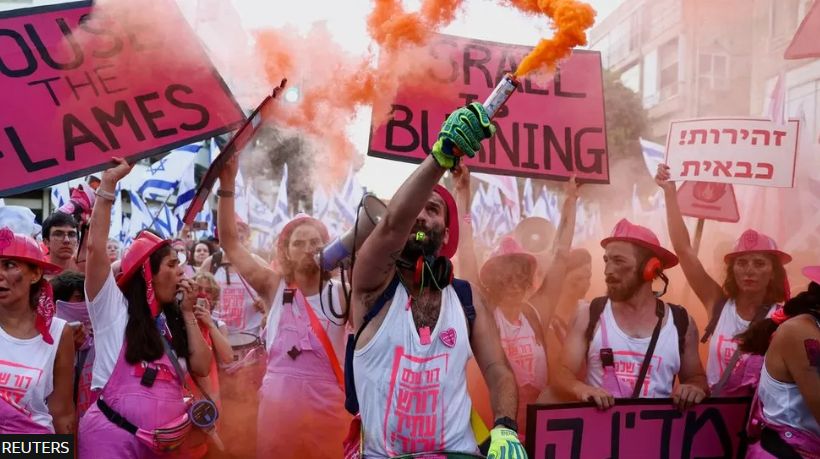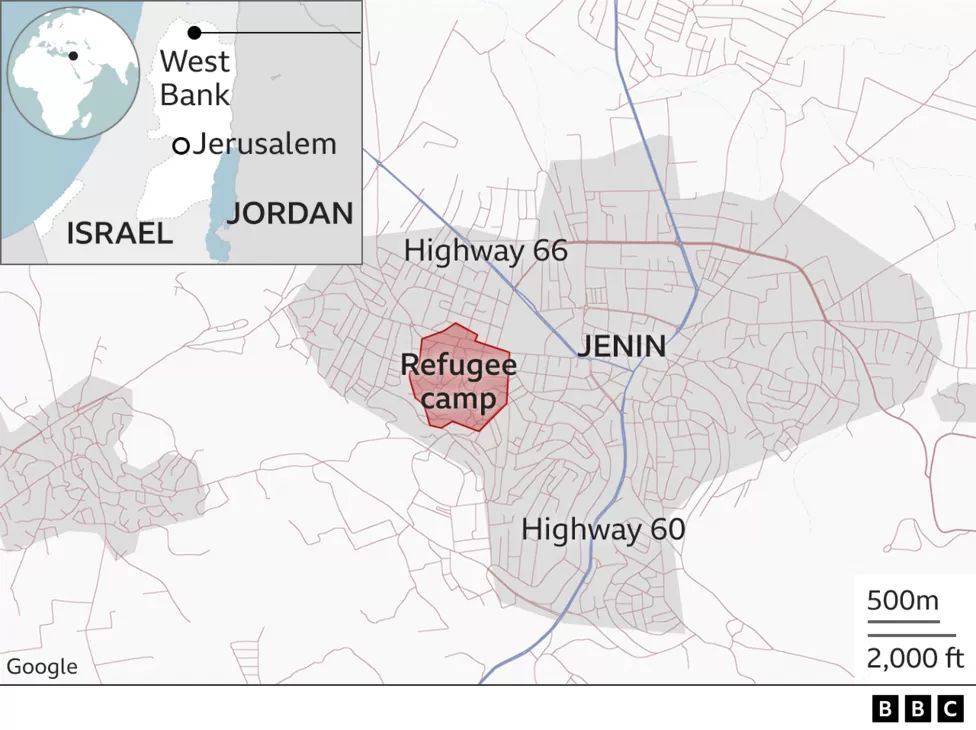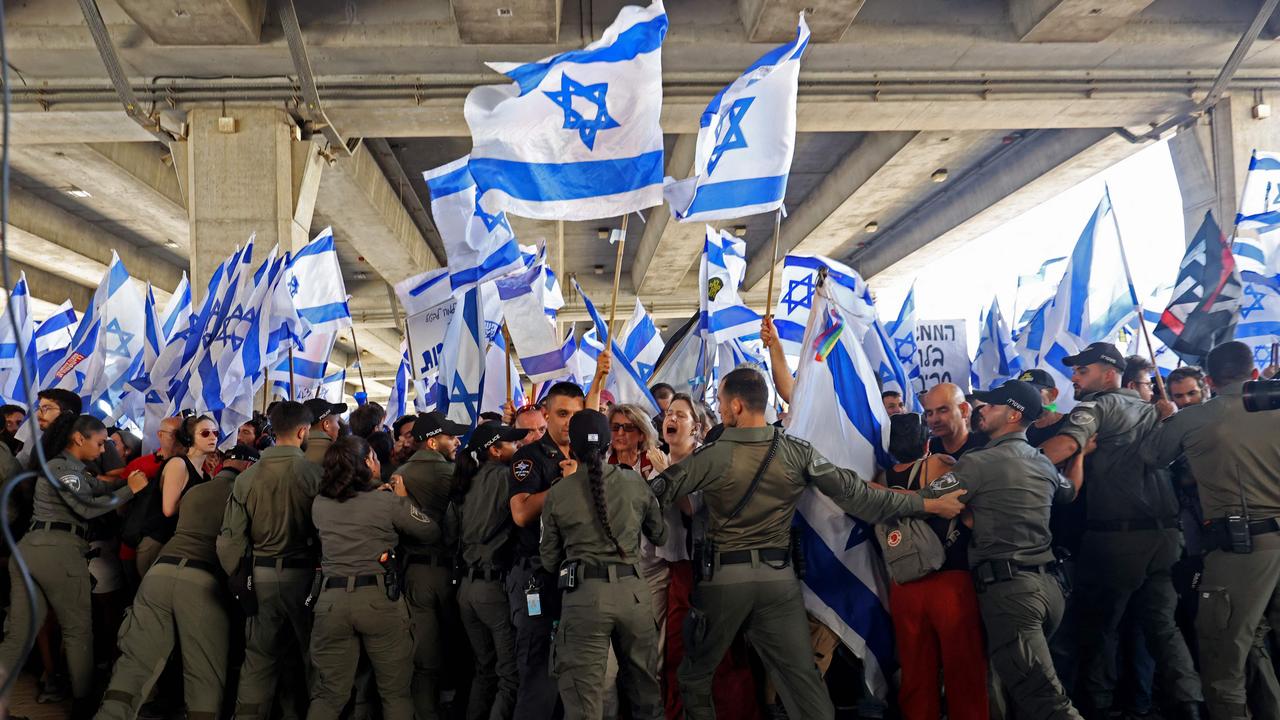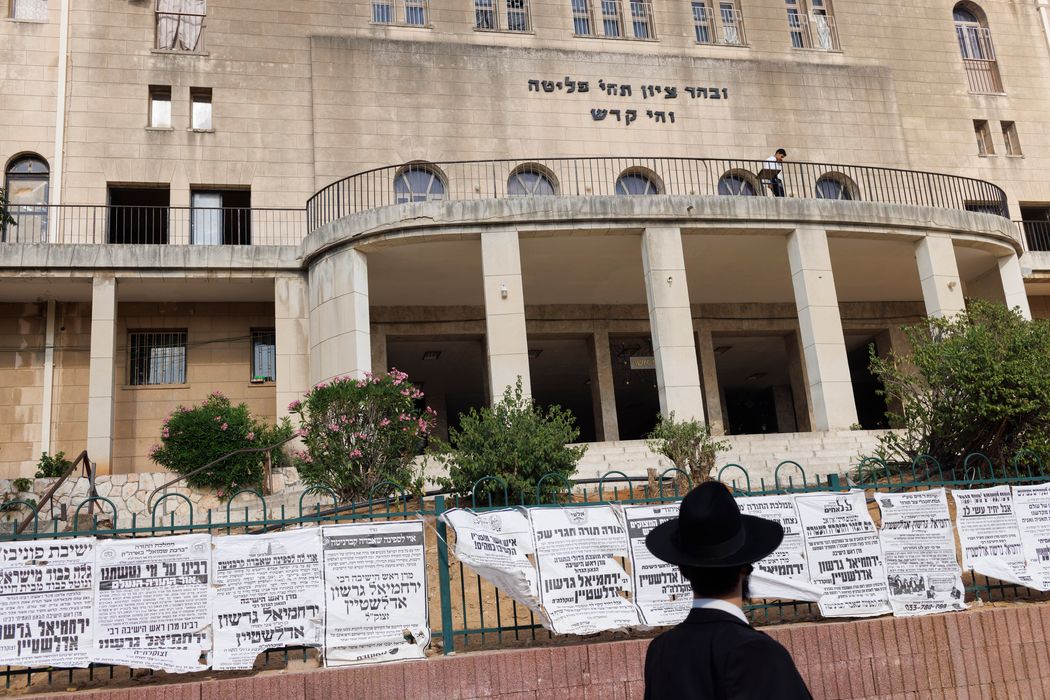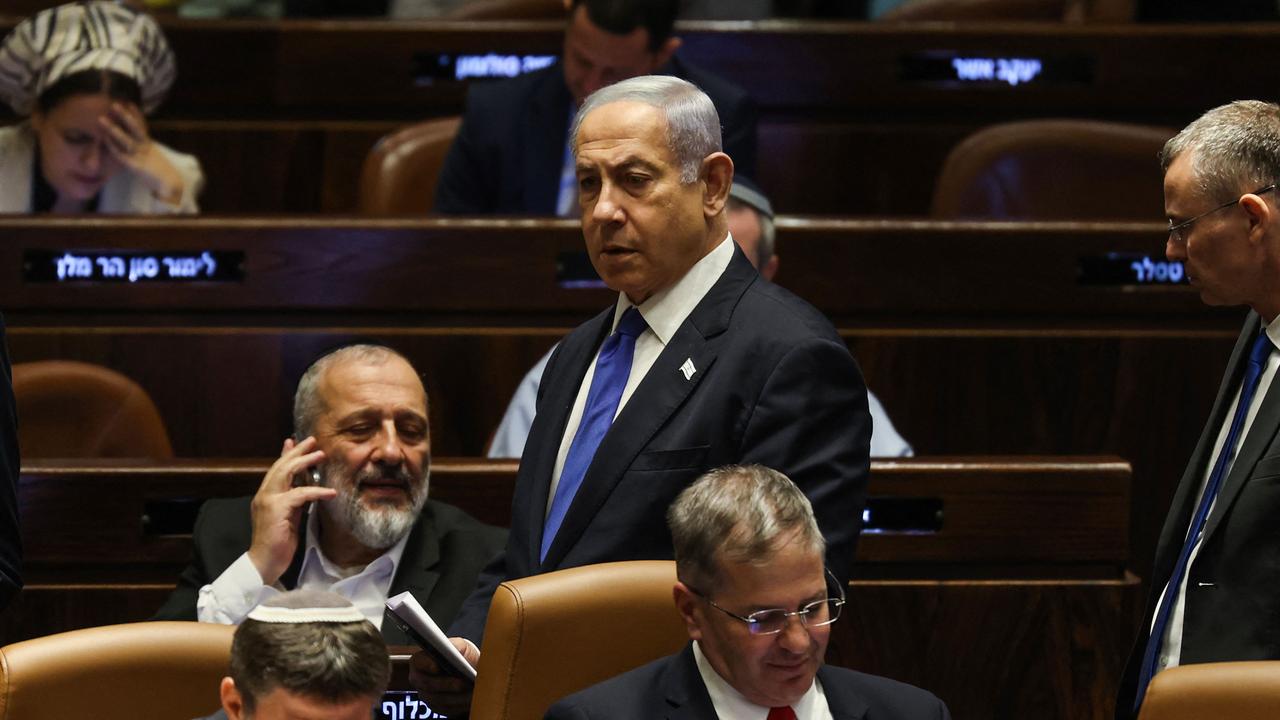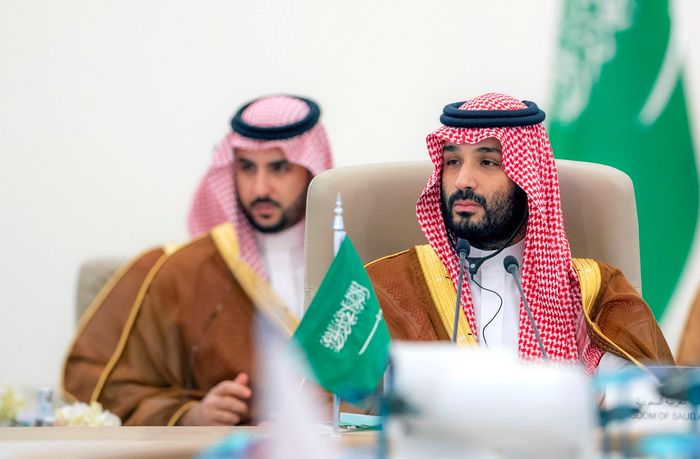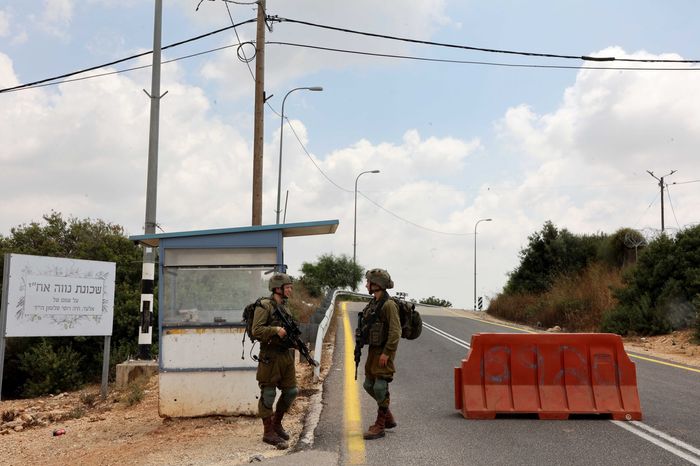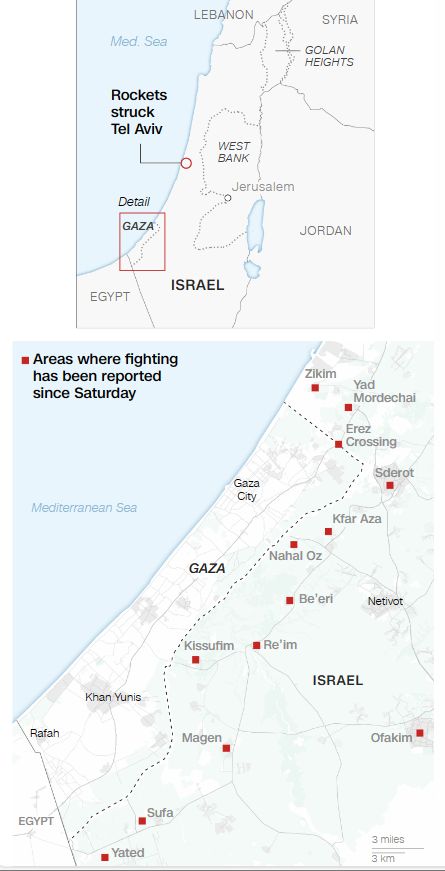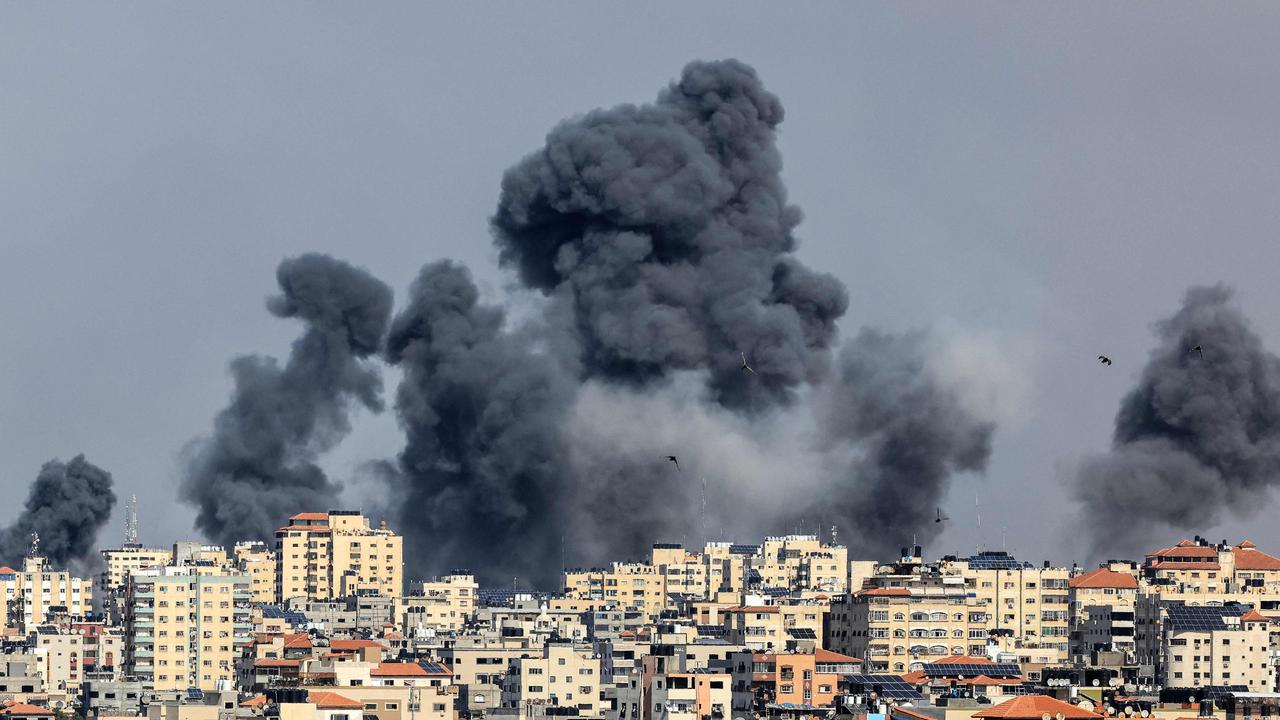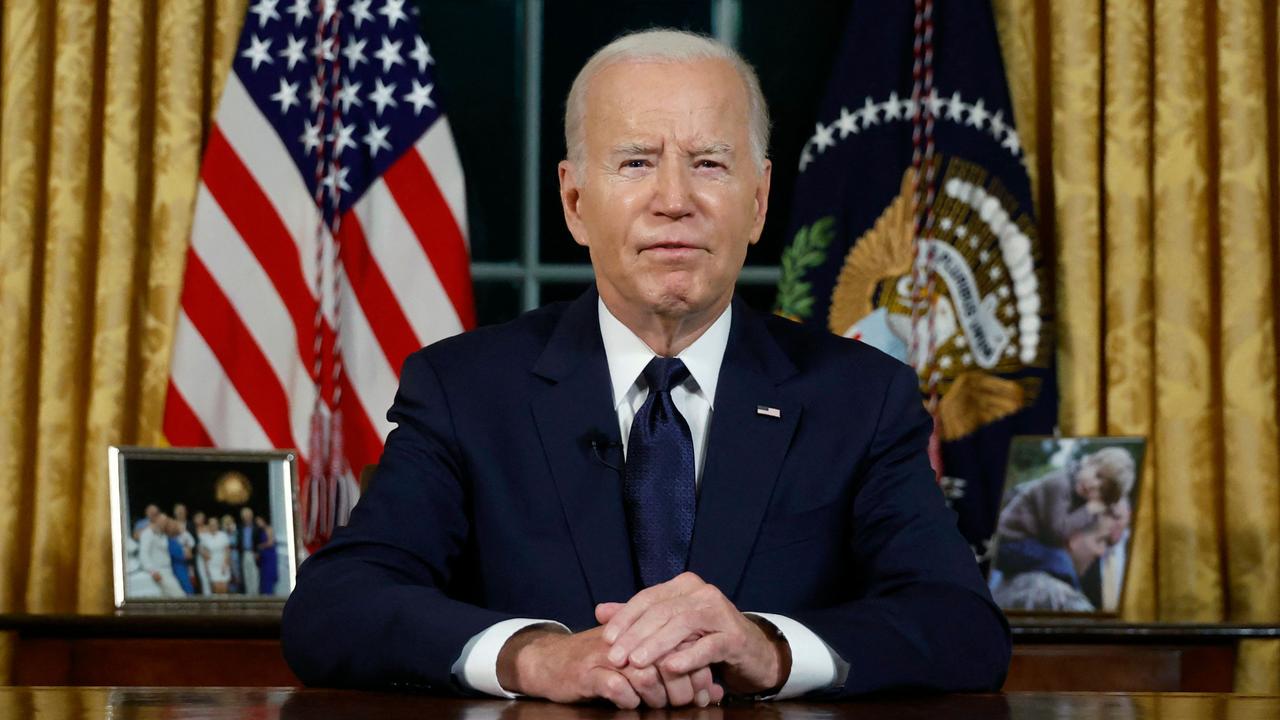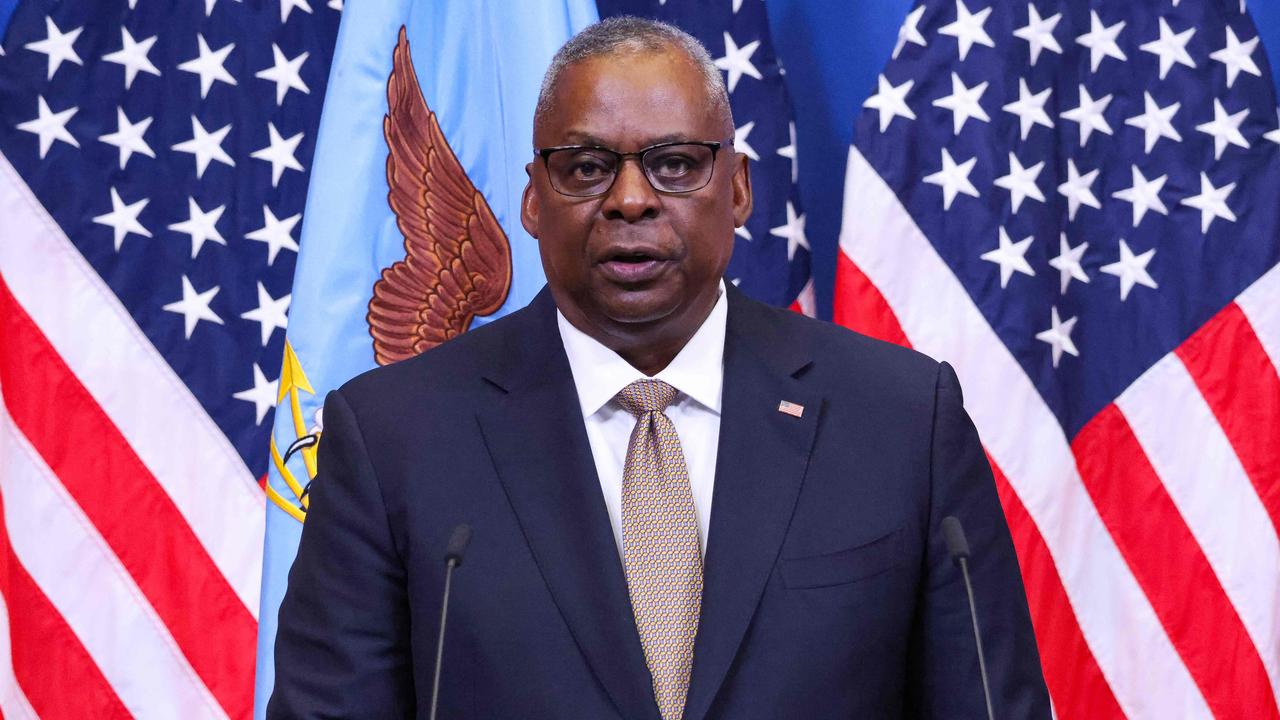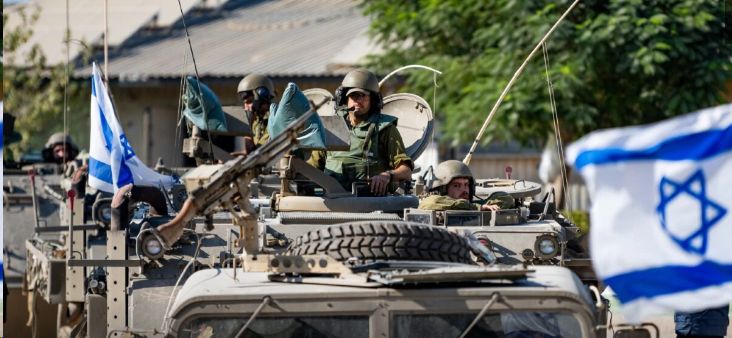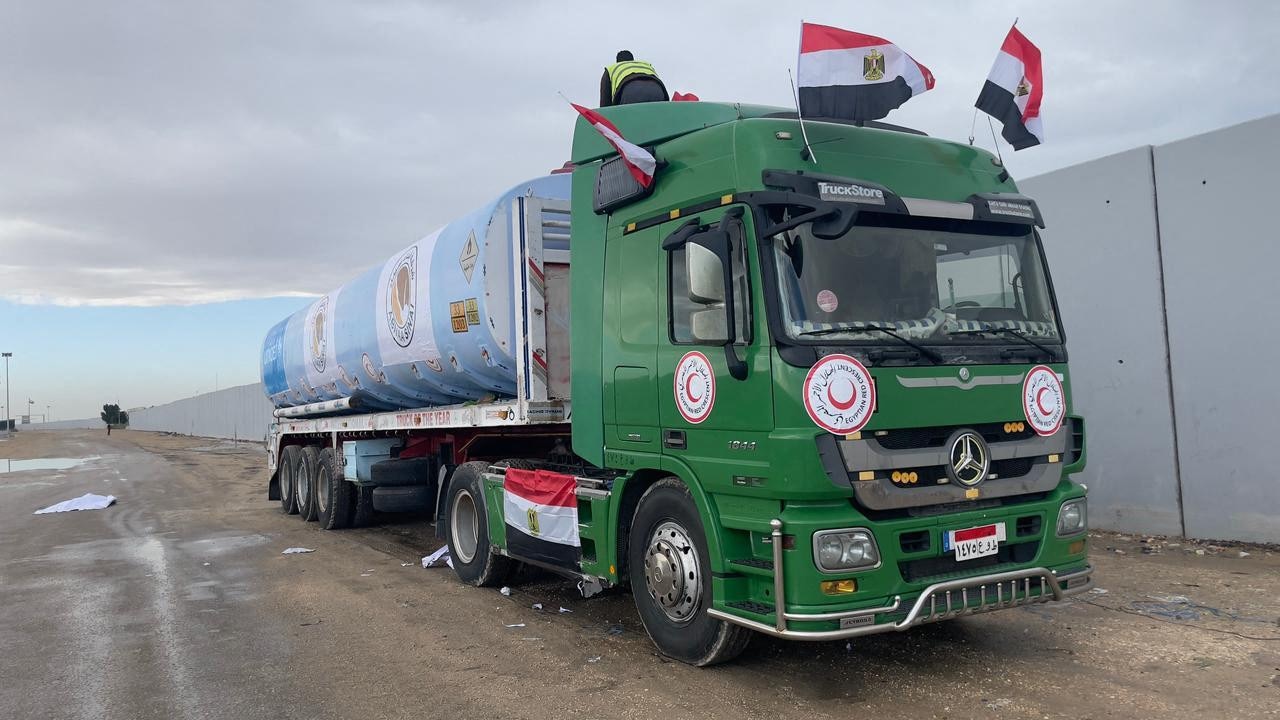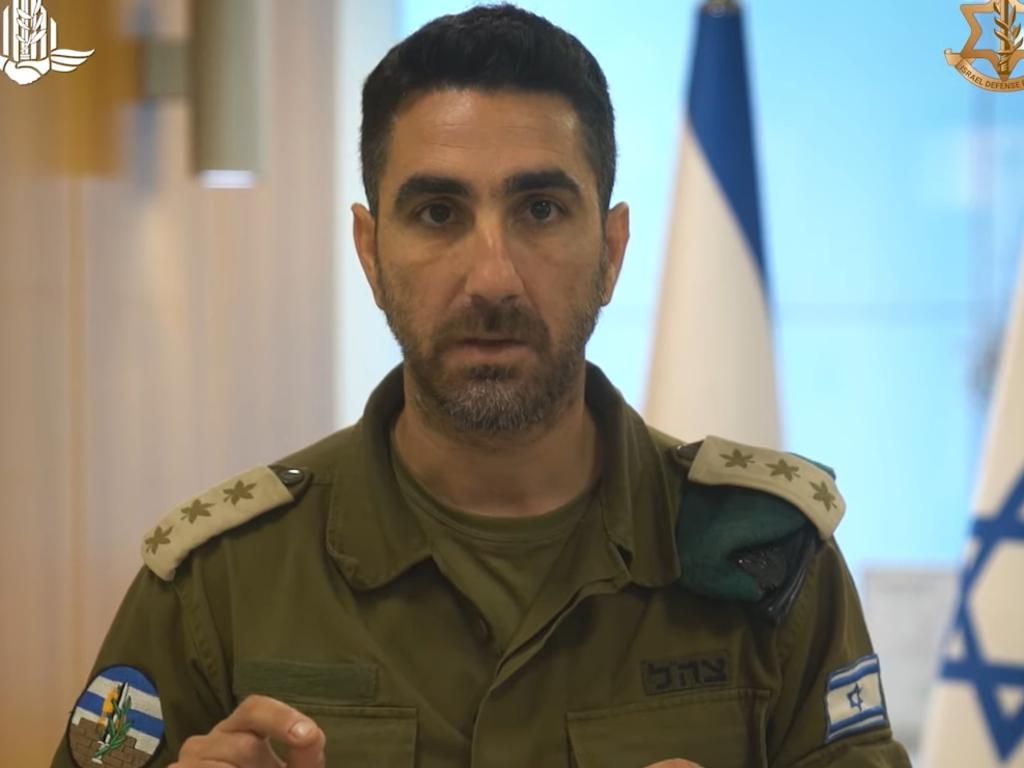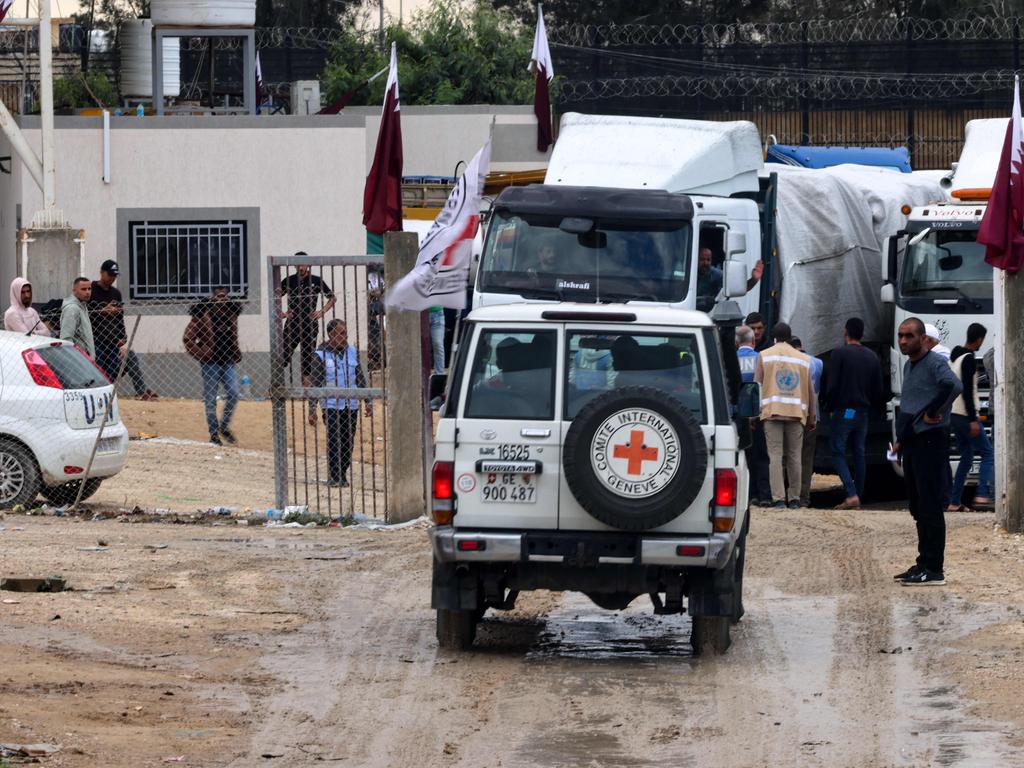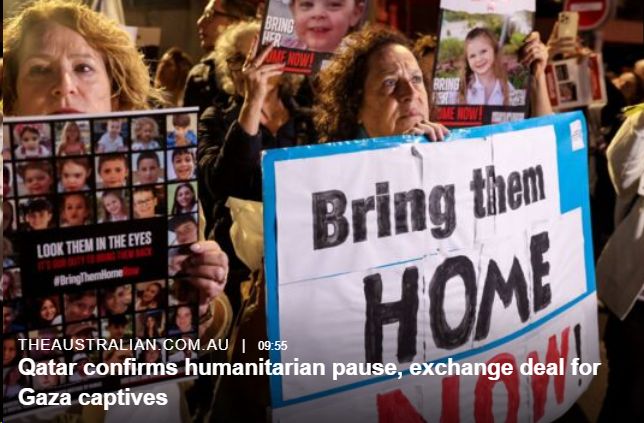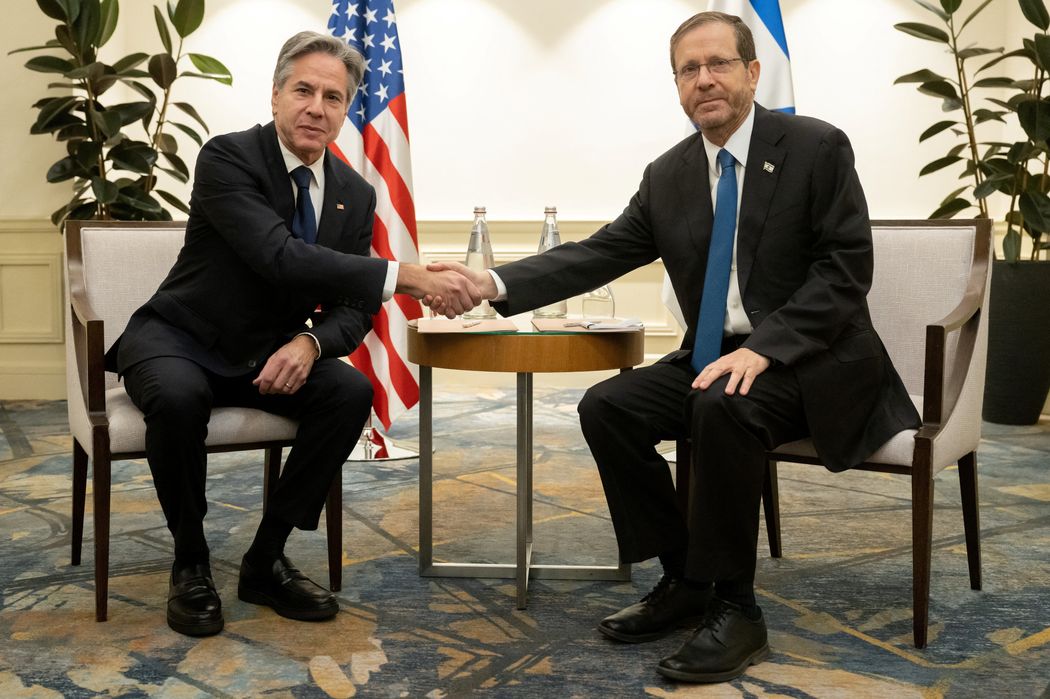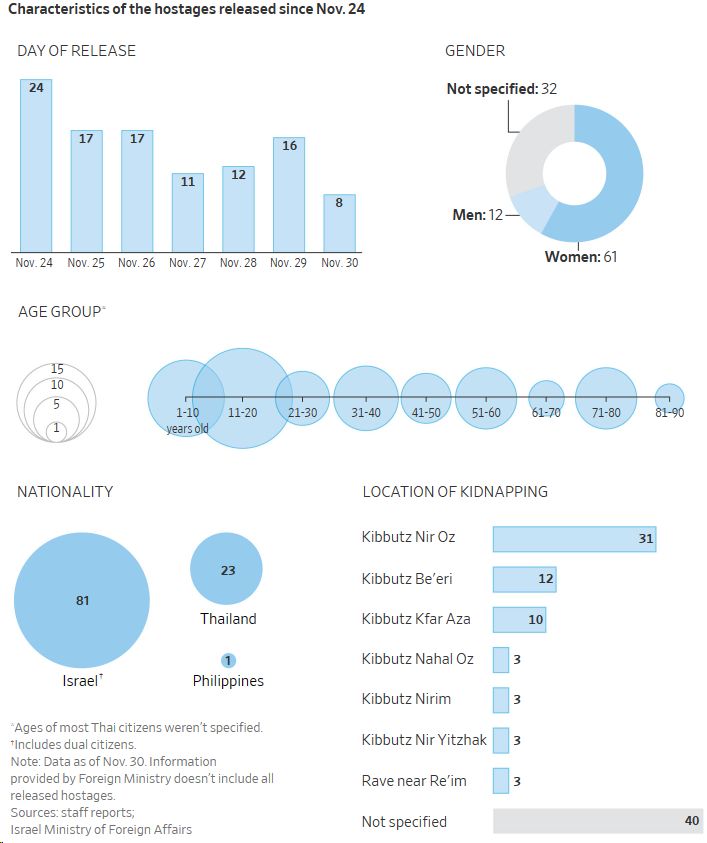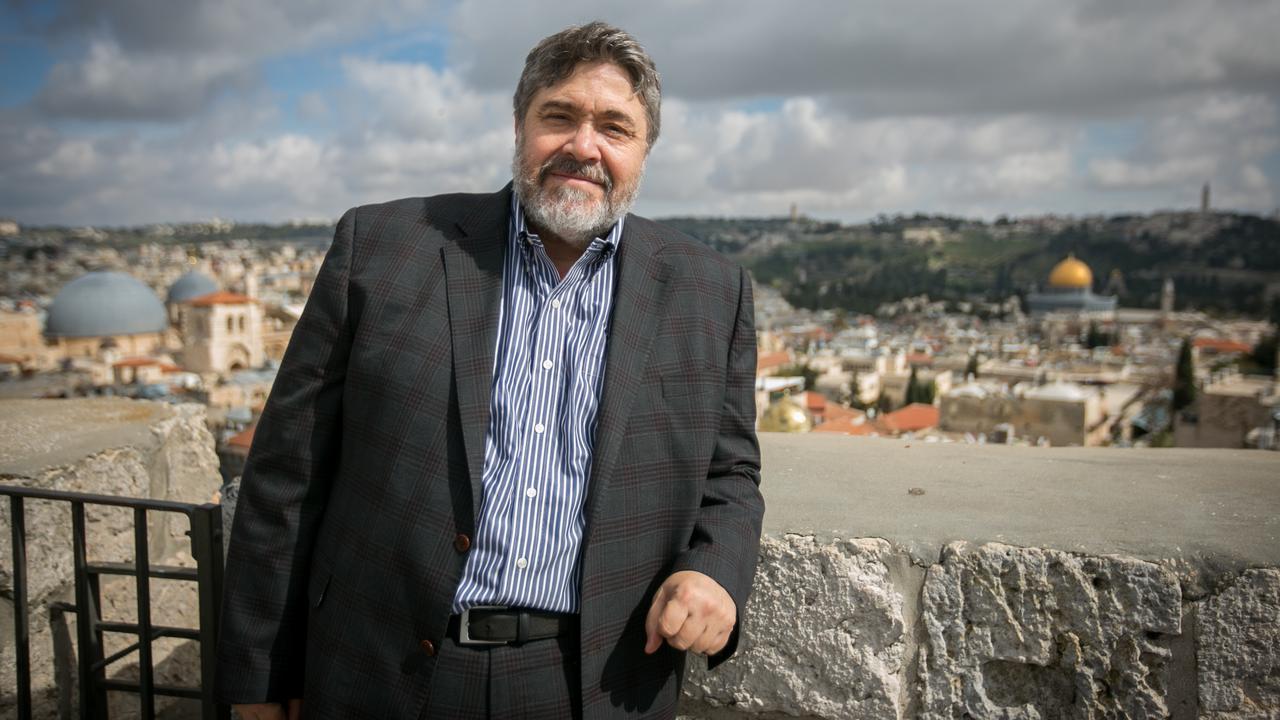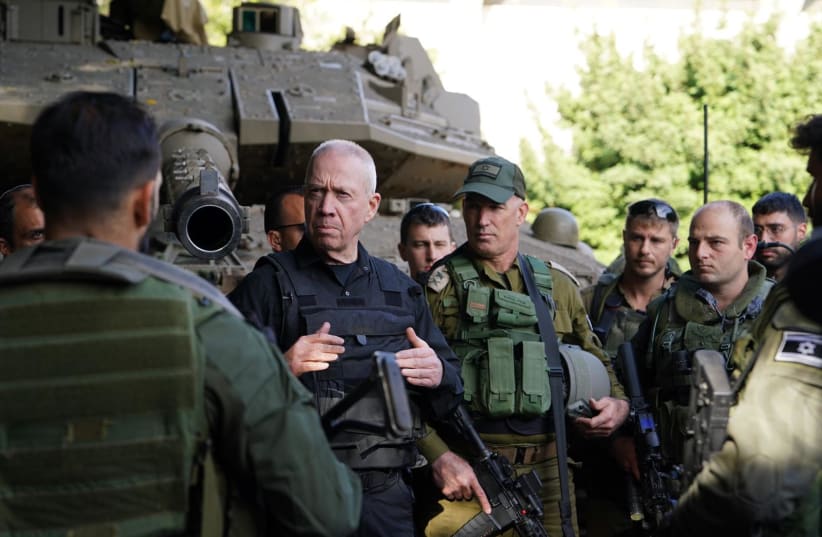Go to Hamas attack on October 7
Click here for prior news from February 9 2022
Click here to look at earlier maps (and events) over 4000 years of history for "Israel - Deep inside the plucky country".
News since June 30 2023
|
Yolande Knell
BBC News
Friday June 30 2023
Jerusalem: After months of protests, Israel's prime minister has made a surprise announcement Thursday morning (Israel time) that he is dropping one of the most contentious parts of his judicial overhaul plans. However, Benjamin Netanyahu's remarks to The Wall Street Journal have failed to appease leaders of the demonstrations and have angered his coalition partners.
In an interview, Mr Netanyahu told the US newspaper he was no longer seeking to give parliament the authority to overturn Supreme Court rulings. "The idea of an override clause, where the parliament, the Knesset, can override the decisions of the Supreme Court with a simple majority... I threw that out," he said.
Leaders of the demonstrations which have caused upheaval in the country since early this year said the proposed changes did not go far enough and pledged to continue their rallies. One protester, Tamar Krongrad, told the BBC that Mr Netanyahu was "throwing sand in the eyes of the audience" after being shunned by Western leaders over the judicial plans. "We are fighting for the soul of our country and one interview with one person doesn't make everything else go away," she added.
Meanwhile, far-right ultranationalist minister Itamar Ben-Gvir, the leader of the Jewish Power party, accused Mr Netanyahu of "surrendering" to civil unrest, saying it was "a victory for violence and a loss for Israel". "We were elected to bring governance and change. Reform is a cornerstone of that promise," he tweeted. An ultra-Orthodox minister, Meir Porush, told a newspaper that the original changes to bolster parliament were a condition for his United Torah Judaism party joining the governing coalition. "Any other agreement is not acceptable to us," he said.
Mr Netanyahu said in the filmed interview that he was "attentive to the public pulse and to what I think will pass muster". He added that he would still push ahead with another controversial idea to give the government more control over judicial appointments, saying that an existing proposal would be modified. "It's not going to be the current structure, but it's not going to be the original structure," he said, without giving more information.
The government — the most right-wing in Israeli history — unveiled its vision to make dramatic changes to the Israeli court system not long after it was sworn in in December. It has long been an argument of the Israeli right that the Supreme Court has been increasingly intruding into politics, making decisions in areas where it should have no authority.
Meanwhile, the ultra-Orthodox minority has been angered over the court's decisions in the past. Ultra-Orthodox leaders wanted to pass the so-called "override clause" to prevent the court from striking down legislation it seeks giving Jewish seminary students a blanket exemption from compulsory military service.
The coalition says it is making reforms to restore the correct checks and balances between branches of government, where parliament as the elected body has greater sway. However, demonstrators vehemently reject the overhaul, saying it will destroy the independence of the judiciary and threaten democracy. They have organised huge protests, opening up damaging splits between the government's supporters and detractors.
In March, after weeks of mass rallies and civil disruption which rattled the financial markets, Mr Netanyahu paused the planned changes to try to reach a consensus in negotiations with the opposition, overseen by the Israeli president. So far, these have not produced a result.
Prof Suzie Navot, an expert in constitutional law who has been representing the largest opposition party, Yesh Atid, in the talks at the president's office, found no reason for encouragement in the prime minister's latest remarks. "This is a coup d'etat in the Polish way, which is done a little at a time," she wrote on Twitter, referring to a series of judicial reforms in Poland in recent years that the European Union said undermined judicial independence.
At the moment, the Israeli government is pushing ahead with an element of the changes relating to what has been termed "the reasonable clause", advancing a bill that would prevent the court system from using a test of "reasonableness" when ruling against decisions and appointments made by all elected officials. There have been reports in the Israeli media that ministers are working on a new version of this. "It's not the reasonableness clause, it's dictatorship," tweeted protest spokesperson Roee Neumann in response. "It's a duty to resist."
While speaking to the Wall Street Journal, Mr Netanyahu also repeated that while Israel was helping Ukraine with civilian defences and an alert system, it could not supply military systems like the Iron Dome.
The air defence system has been successfully used in recent years to intercept thousands of Palestinian rockets fired at Israel from the Gaza Strip. Mr Netanyahu said there was a danger that if the technology was shared, it could fall into the hands of the country's enemies. "We're concerned... that systems that we would give to Ukraine would fall into Iranian hands and could be reverse engineered — and we would find ourselves facing Israeli systems used against Israel."
|
AFP, The Australian
Wednesday July 5 2023
Israel carried out air strikes on the Gaza Strip Wednesday in response to rocket fire from the coastal enclave, as the military began withdrawing forces from Jenin in the occupied West Bank after a major two-day operation in the area. Twelve Palestinians and an Israeli soldier have been killed during the assault on Jenin refugee camp, launched early Monday under Prime Minister Benjamin Netanyahu's hard-right government.
The Jenin raid, Israel's biggest military operation in years in the West Bank, employed hundreds of troops as well as drone strikes and army bulldozers that ripped up streets. During the raid, the army said it had uncovered militant hideouts, arms depots and an underground shaft used to store explosives.
The army said its forces had dismantled six explosives manufacturing facilities and three operational situation rooms in Jenin, and confiscated large quantities of weapons. "The weapons were located in hideouts, a mosque, pits concealed in civilian areas, operational situation rooms, and in vehicles," it said.
"In the last five years, this is the worst raid," said Qasem Benighader, a nurse at a hospital morgue. The Palestinian foreign ministry labelled the escalation "open war against the people of Jenin". Medical charity Doctors Without Borders also condemned Israeli forces for firing tear gas inside Khalil Suleiman hospital in Jenin, calling it "unacceptable".
Palestinian health minister Mai al-Kaila even accused the army of shooting at Palestinians in a courtyard of the Jenin public hospital. "Israel's aggression reached its climax this afternoon when citizens were shot at directly in the courtyard of Jenin hospital wounding three, two of them seriously," the minister told reporters, adding that forces had also stormed the Ibn Sina hospital.
The Israeli army said there were reports on social media regarding fire by soldiers towards a hospital. "The reports are not currently known to security forces," it said, adding that "terrorist organisations have exploited civilian areas as a hideout". Shops in Jenin were shuttered amid a general strike and the near-empty streets littered with debris and burned roadblocks.
"The most dangerous is what happened inside the camp, where there is no electricity, no water, and no roads for those who need to go to hospital," Jenin mayor Nidal Abu Saleh told AFP. Around 3,000 people had fled their homes in the refugee camp since the assault commenced, said deputy governor of Jenin, Kamal Abu al-Roub. Imad Jabarin, one of those leaving the rubble-strewn camp, said: "All aspects of life have been destroyed, there is no electricity and no communications... we are cut off from the world to some extent."
Tel Aviv
Elsewhere, a car ramming and stabbing attack in Tel Aviv on Tuesday wounded seven people before the suspect was shot dead. The driver in Tel Aviv was thought to have intentionally hit several pedestrians on a shopping street before getting out of the vehicle to "stab civilians with a sharp object", police said. The "terrorist", a West Bank resident, was shot dead by an armed civilian passerby, said police chief Yaakov Shabtai. Hamas, meanwhile, praised the "heroic" attack in Tel Aviv as "an initial response to crimes against our people in the Jenin camp".
Gaza Strip
Early Wednesday, the army said it carried out air strikes on the Gaza Strip after it intercepted five rockets fired at Israeli territory. A Palestinian security source said the attack hit a military site of the militant group Hamas in northern Gaza but caused no injuries.
The United Nations decried the violence in Tel Aviv and Jenin. "The killing, maiming and the destruction of property must stop," UN rights chief Volker Turk said. In the Israeli-blockaded Gaza Strip, protesters burned tyres near the border fence with Israel.
Israel has occupied the West Bank since the Six-Day War of 1967. Excluding annexed east Jerusalem, the territory is now home to around 490,000 Israelis in settlements considered illegal under international law. The Palestinians, who seek their own independent state, want Israel to withdraw from all land it seized in 1967 and to dismantle all Jewish settlements. Netanyahu, however, has pledged to "strengthen settlements" and expressed no interest in reviving peace talks, which have been moribund since 2014.
At least 190 Palestinians, 26 Israelis, one Ukrainian and one Italian have been killed this year, according to an AFP tally compiled from official sources from both sides. They include, on the Palestinian side, combatants and civilians, and on the Israeli side, mostly civilians and three members of the Arab minority.
|
Dov Lieber, The Wall Street Journal
Wednesday July 12 2023
Protesters blocked roads across Israel on Tuesday to oppose the government’s new effort to curb the power of the country’s courts, in what organisers called a “day of disruption”. The demonstrations, including a protest at the country’s main airport, cut off important transportation routes, harking back to extensive protests in March that paralysed the nation and forced Prime Minister Benjamin Netanyahu to pause the effort to overhaul the justice system.
Thousands gathered outside the US embassy branch in Tel Aviv, blowing whistles, playing drums and waving Israeli and American flags, as protesters look increasingly at the Biden administration as an ally in opposing the overhaul in the wake of comments by Joe Biden calling for Mr Netanyahu to slow the legislation down and seek compromise. “They need to know how important it is for us to have their support, and to keep democracy alive in Israel,” said Susan Burger, 64, an American-Israeli retiree in Tel Aviv. “The larger protests get, I think Bibi will have to back down.”
Companies across the country gave employees the option to take the day off to join the protests, and avoid the chaotic commutes that the disruptions were causing. Police said they arrested at least 71 people for disturbing public order, 45 of whom were released, and authorities deployed water cannons against demonstrators blocking streets.
Hundreds of thousands of Israelis have participated in the 27 straight weeks of protests, some of the largest in the country’s history, since the government revealed its plans in January to change the judiciary. The legislation has exposed fissures between Israel’s secular and religious communities, with supporters saying the courts’ power must be reined in and critics saying the judiciary is the only real check on the government.
The intensification of the protests comes after Mr Netanyahu’s coalition began voting on judicial legislation again on Monday night without any support from the opposition. Mr Netanyahu had held months of discussions with the opposition, but the talks stalled late in June, and the Prime Minister said he would move ahead with a revised version of the changes.
The overhaul consists of several bills that would generally weaken the power of Israel’s Supreme Court to overturn legislation and government decisions.
Mr Netanyahu told The Wall Street Journal he scrapped legislation that would have allowed parliament to override Supreme Court decisions, but soon after, his Likud party and other senior coalition officials said the override legislation hadn’t been scrapped but would be revised, leaving the fate of that bill unclear. Another key question is the fate of a bill that would give the ruling coalition majority control over the committee that appoints judges. Mr Netanyahu told the WSJ the bill would be revised, but didn’t specify how. Opponents say it will politicise the court.
On Monday, Israel’s parliament, the Knesset, voted on a bill that would curtail the Supreme Court’s power to strike down government officials’ decisions on the grounds of “reasonableness”. The bill needs two more votes before being passed into law.
Yoram Cohen, 60, a financial adviser from Tel Aviv who carried an American flag at the demonstration outside the Tel Aviv embassy, voted for Mr Netanyahu in the election last year but said he never heard the Prime Minister talk about an overhaul of the judiciary in the campaign. “The government has been taken hostage by extremists, and Netanyahu in a certain way needs the US,” he said. “What you’re seeing here is pressure being put on the US to pressure Netanyahu.”
Mr Biden and others in his administration have called on the Netanyahu government to seek a consensus on changes to the justice system. Protesters said they want to keep pressure on the Biden administration to oppose changes. The legislative push has reignited calls by reservists to buck military service, which could have national-security consequences.
|
The Australian
Dov Lieber, Shayndi Raice
The Wall Street Journal
Monday July 24 2023
BNEI BRAK (5 km east of Tel Aviv) Since Israel’s founding, mandatory military service for Jewish Israelis has been widely embraced as a unifying force in a divided society. Now the issue threatens to tear the country apart. Israel’s ultra-Orthodox Jews, a fast-growing and potent political bloc, have long shunned military duty along with other aspects of secular society. Their effort to obtain a permanent exemption from service has repeatedly been foiled by Israel’s Supreme Court. Allied with Prime Minister Benjamin Netanyahu’s Likud Party, they are pushing for a judicial overhaul to weaken the court.
The first part of the overhaul, which sparked mass protests that have shaken Israel for 28 straight weeks, is expected to be ratified by the Israeli parliament, or Knesset, on Monday (Israel time).
Israeli Prime Minister Benjamin Netanyahu spoke with Wall Street Journal reporter Dov Lieber about the country’s Ultra-Orthodox in response to their increasing political power in Israel. The clash goes to the heart of Israel’s inherent identity issue: Is it a modern liberal democracy or a society defined by religion? Many secular Israelis see the judicial reforms as a step toward increasing the power of people who would use religion to roll back fundamental civil rights.
“Secular society wants a full modern state,” said Gilad Malach, a scholar with the Israel Democracy Institute, a Jerusalem think tank. “The ultra-Orthodox aim is to have a strong religious society.”
Ultra-Orthodox Jews such as Yehoshua Menuchin, who at 40 has a wife, six sons and no steady job, refer to themselves as Haredim, meaning those who tremble before God. Many Haredi men don’t work regularly, instead choosing to study holy texts in religious seminaries called yeshivas. They argue that they contribute to the state in their own way by preserving Jewish tradition and providing divine protection for Israel. “I don’t think we are making any less of a sacrifice,” Menuchin said. “I’ve passed on the pleasures of this world. I’ve given up on restaurants, on the cinema, on going to clubs. I’ve given up many things in my life.”
One element of Israeli society Menuchin and many other Haredim avoid is mandatory military service, a rite of passage in mainstream Israeli society. Most Jewish men and women spend two to three years in the army beginning at the age of 18. Friendships made in the army can also serve as the basis for professional connections after military life.
The Israeli Supreme Court has twice struck down legislation aimed at formally exempting Haredim from the draft, most recently in 2017 on the grounds that it created unequal treatment of citizens. The court has permitted temporary exemptions so that the government can find a solution. Those decisions exacerbated friction between religious conservatives and the Supreme Court, which has long served as a strong defender of individual liberties, upholding the rights of Israel’s Arab citizens, women and LGBTQ people.
The Haredim now have the political heft to fight back. Their two political parties—one representing Jews of European descent and the other Jews from the greater Middle East—make up the second-largest bloc in the current government after Likud, with 18 seats in the 120-seat Knesset. They are key to Netanyahu’s grip on power, since his alliance controls just 64 seats in total. They have often threatened to leave the coalition if their various demands aren’t met.
The Haredi bloc in the Knesset hopes to enact legislation that would permit separating men and women in some public places. In an interview with The Wall Street Journal, Netanyahu called the Supreme Court “the most activist judicial court on the planet,” and said that “there is a growing understanding in the Israeli public that there’s a need for judicial reform.” Still, he says he has aimed to moderate several of the original proposals and instead “proceed in a measured way.”
The government wants to overhaul the system and hand more power to elected officials. Proposals include striking the court’s ability to overturn government decisions and giving lawmakers a majority say on the committee that picks new judges. The backlash from secular Israelis and some moderate religious Jews has been intense.
In March, Ron Scherf, a 51-year-old reserve lieutenant colonel, helped organize a march through Bnei Brak, Israel’s largest Haredi city. Protesters carried signs urging Haredim to join the military. Some Haredim dropped fliers on protesters saying they would never serve in an “apostate” army.” “We really believe there needs to be a new contract in Israel between the secular and Haredim,” Scherf said. “I don’t see a way that Israel can exist as a liberal, prosperous and strong country if the current situation doesn’t change.”
“We are getting close to a major clash,” counters Yisrael Cohen, a popular Haredi media figure. “If no side takes responsibility, it won’t end up in a good place.”
Military service aside, many in Israel believe the Haredi way of life represents a direct threat to the future prosperity of the country. About half of Haredi men don’t work. Instead, they pursue religious studies and live off a combination of their wives’s salaries, charity, government grants and subsidies. With a steadily increasing birthrate that today stands at around 6.5 children per female, compared with around 3.0 for the general population, according to the Israeli central bureau of statistics, the roughly 1.3 million Haredim represent 13.3% of the population. As its fastest-growing segment, they are on pace to be nearly one-third of all Israelis by 2065.
Haredim have used their political power to expand discounts on municipal taxes, subsidies for early child care and rental assistance for large low-income families—benefits that are technically available to all Israelis but that tend to favor Haredim because of their demographic characteristics. They or their yeshivas also enjoy stipends or grants for around 140,000 Haredim men who study full-time, according to the Israel Democracy Institute. The Institute, led by a former centrist politician, found Haredim pay one-third less in taxes than non-Haredi families.
In a letter to Netanyahu in May, over 200 leading Israeli economists warned that a plan to increase funding to Haredi educational institutions that refuse to teach secular subjects, along with the increase in stipends for full-time Torah learners, would transform Israel into a “Third World” economy by leaving Haredi children unprepared for today’s workforce.
The Haredim aim to expand religion in even more areas of public life. Since Netanyahu returned to power last year, they have passed a law allowing hospitals to ban bread products from entering public hospitals over the Jewish holiday of Passover. They have also said they hope to enact legislation that would permit separating men and women in some public places or events frequented by Haredim, something widely recognized by Israeli lawyers as unconstitutional.
Haredim already wield tremendous power over many aspects of public life. They control the Rabbinate, a governmental body that oversees marriage and divorce and determines who is a Jew. The Rabbinate’s long-standing refusal to recognize any non-Orthodox branches of Judaism has been a point of tension, particularly among diaspora Jews. They also have managerial control over prominent Jewish holy sites.
The recent protests in Bnei Brak left Yehoshua Menuchin’s wife, Dvora, unimpressed. “The people who are protesting, they don’t know anything about Judaism,” she said. “They are like babies. If they knew about Judaism, they wouldn’t do this.”
Her neighborhood is crowded, loud and vivacious, with pedestrians—including many children—filling the sidewalks on narrow streets lined with sacred book stores and small eateries selling traditional Eastern European Jewish food such as kugel, gefilte fish and cholent. On each corner and by each bus station stand rows of charity boxes, much of which will end up going to yeshiva students and their families.
The Menuchins survive on a combination of money from an American donor that sponsors Yehoshua’s full-time learning, government subsidies, interest-free loans from friends or family and odd jobs. Dvora stays home most days cooking and cleaning, and makes a little money on the side with a machine that can personalize Jewish items like yarmulkes. Menuchin gives lectures on religious topics in the evenings. Sometimes his audience will give him small donations. For a small fee he also repairs Judaica, like phylacteries, the small leather boxes containing scrolls with words from the Torah that Jewish men tie to their head and arm during morning prayer.
The Menuchins live in a three-bedroom apartment, with their six boys divided between two rooms. All their furniture was bought second-hand. Menuchin wakes up early enough to attend morning prayers at 7 a.m., donning the black pants and white shirts worn by Haredi men. After breakfast, he drives to his yeshiva, where he spends the day largely studying the Talmud, an ancient Jewish text that serves as the basis for Jewish law.
Menuchin’s yeshiva—named Kisay Rahamim, or seat of mercy, which largely caters to Jews of North African descent—requires that he swipe in with an electric card so the state can confirm that he’s in fact spending his days studying. Menuchin and his boys stopped all secular education after 8th grade. They can’t read or speak English and Menuchin can only do basic addition and subtraction. He says that’s all he needs to get through life.
Rabbi Eli Paley, head of the Jerusalem-based Haredi Institute for Public Affairs, said that the Torah-learning lifestyle produces men who are a “good husband, a good father, a good community member, and a good volunteer.” “Is that worth nothing?” he said.
While economists say funding the yeshiva system dooms the majority of Haredim to poverty, they argue they aren’t interested in the capitalistic rat race, and that their way of life keeps them happy and fulfilled. “If you go to an amusement park, or drink a cup of wine, you’re happy for that moment. But when you learn Torah, the joy stays with you,” said Menuchin.
|
Dov Lieber and Shayndi Raice, The Wall Street Journal
Tuesday July 25 2023
Israel’s Parliament passed a divisive judicial overhaul, defying months of protests and plunging the country further into a political crisis that has exposed rifts over its identity and raised fears about its national security. The law’s passage on Monday by Prime Minister Benjamin Netanyahu’s coalition — without any opposition support — marks a pivotal juncture for Israeli society, setting up a potential showdown with the country’s Supreme Court, the institution whose power the law was designed to curb. It presents a decisive moment for thousands of military reservists who have said they would quit and the business, union leaders and medical professionals who have threatened mass work stoppages.
And it could complicate Israel’s relationship with the US and other allies, who have long considered it the only full-fledged democracy in the Middle East. President Biden took the unusual step of calling on Netanyahu to compromise before passing the legislation. The White House released a statement calling the bill’s passage “unfortunate.” Voting in favor of the bill were Netanyahu’s entire coalition of 64 lawmakers, widely viewed as the most right wing, nationalist and religious in the country’s 75-year history. They cheered the law, which takes away the Supreme Court’s ability to nullify government decisions it finds “unreasonable in the extreme” — a concept they said was nebulous and allowed liberal judges to overturn the will of an increasingly right-wing electorate.
It is the first in a series of laws the coalition wants to pass to limit the power of the court system. Next up is a bill that would give lawmakers more power to select judges — a move that is more contentious than the bill passed on Monday. It could be voted on in the fall. “We made the first move in the historic process of fixing the justice system,” said Justice Minister Yariv Levin, widely considered the architect of the overhaul.
In a speech Monday night, Netanyahu said that his coalition would continue to reach out to the opposition in order to reach agreements on any judicial legislation going forward. “No side will control the court. This cannot happen. It will not happen on our watch,” Netanyahu said. The legislation passed after talks to forge a compromise collapsed. Opposition lawmakers walked out of the room, boycotting the vote.
Mass demonstrations broke out across the country Monday, and more were planned late into the night. Police worked to prevent protesters from storming the Knesset. Tens of thousands shouted “Democracy!” and blew loud horns as they filled the streets of Jerusalem near the Knesset and other government buildings.
“We refuse to accept this,” said Roee Basha, 34. “It is clear to us all that there is no alternative. We either escalate or we leave the country.” Yair Lapid, the leader of the opposition, called passage of the legislation “the destruction of Israeli democracy.” “We will not give up,” he said. “We will not surrender. We will not let them turn Israel into a broken, undemocratic country, which is run by hatred and extremism.” Monday’s legislative action could set off an extraordinary series of events that will test Israel’s unity, including a challenge to the law in front of the Supreme Court. A nongovernmental organization said it petitioned the court Monday, claiming that the law fundamentally changes the nature of Israeli democracy and that the process to pass the law was flawed.
“We are moving one step closer to a constitutional showdown,” said Yuval Shany, a law professor at Hebrew University in Jerusalem. The courts, Shany said, have never struck down one of Israel’s so-called basic laws, which are piecemeal legislation that is the closest thing the country has to a constitution. But, he said, justices have suggested in various rulings that the court has the right to strike down such a law if it fundamentally changes the nature of democracy in Israel or if it abuses the constitutional process.
The bill’s passage represents a challenge for Israel’s military, often called a “people’s army” for its reliance on volunteer reserves. The judicial overhaul has alienated many military reservists, some of whom see the move as a power grab by ultra-Orthodox Jews, the vast majority of whom don’t serve in the army. Thousands of military reservists said this week they would stop reporting for volunteer duty if the legislation passed, although it remains to be seen if they will carry through on that promise. Military officials have warned that the legislation was undermining unity within the military.
“I have no words. I want to cry,” Ben Levy, a reserve combat soldier and psychology student from Netanya, said after Monday’s vote. He said it was likely that many more reservists will announce they won’t serve any more and many will do it quietly by finding an excuse not to show up.
Netanyahu, the country’s longest-serving prime minister now in his sixth term, brought the judicial legislation back from defeat after his government first tried to pass a different package of bills in March. He postponed the effort after mass protests and a general strike paralyzed the nation, but he said last month that he would pass the overhaul in modified form. Netanyahu, who was released from the hospital Monday after being fitted for a pacemaker, hasn’t historically been an advocate for changing the judiciary, but he was under intense pressure to pass it from his right flank, which gives him his narrow parliamentary majority.
On the other side were Biden, business leaders and hundreds of thousands of protesters who have demonstrated every weekend for more than six months. On Monday, the country’s main labor union, the Histadrut, said it was preparing for the possibility of calling a general strike, potentially crippling the country again.
The debate over the judicial legislation has cast a light on Israel’s societal divide over what it means to be both a Jewish and a democratic state. The state was founded and controlled in its early decades by secular socialists of largely Eastern European descent. They envisioned a culturally Jewish but socially liberal democratic state. Over recent decades, an alliance between various segments that have come to represent the Israeli right — religious Zionists, settlers, the ultraorthodox and Jews of Middle Eastern descent — has grown in both numbers and power. Netanyahu’s Likud party, which is itself secular, has united those segments on the right into a political powerhouse.
“This is a clash between the Israelis and the Jews,” said Gideon Rahat, chair of the political science department at the Hebrew University in Jerusalem. The Israelis, he said, represent the founders who envisioned a secular Zionist state while the Jews are those who want to rebuild the Jewish kingdom that reigned over the land 2,000 years ago. “It’s a clash between a more civil identity and a more religious identity,” he said.
In a country without a powerful presidency, the Supreme Court has long been the only check on the government’s ruling coalition, often thwarting decisions by right-wing governments in recent years. One recent example was when the court nullified Netanyahu’s appointment of a key ultraorthodox ally who was convicted of corruption and tax evasion to be interior, health and finance minister. Israel’s finance minister, Bezalel Smotrich, said the coalition was trying to “restore the balance between the branches of government.” “Together we will continue to make repairs responsibly,” he said. Hodaya Ganon, 27, a social worker from the northern Israeli city of Haifa, said passing the legislation Monday counted as long-awaited recognition of right-wing voters. “Until now, all previous right-wing governments have bent to the will of the other side at the expense of their voters, despite having won fairly and democratically,” she said.
It is, in part, Netanyahu’s legal troubles that have brought the country to this point. Throughout most of his two decades in power, Netanyahu built coalitions from the right, center and the left. After his 2019 indictment on bribery and fraud — which he denies — his former centrist partners and even some on the right refused to sit in a government with him, leading him to briefly lose power. When he returned as premier late last year, he built a coalition that included two ultraorthodox political parties and an alliance of ultranationalists.
Shlomit Ravitsky Tur-Paz, a legal and Jewish studies scholar with the Jerusalem-based Israel Democracy Institute, said that even though the right wing has been in power for decades, many voters feel as if the country is ruled by secular, liberal elites and that is most evident in the power wielded by the court. “They still feel they are the ones who don’t have the power,” she said. “So that’s what they are trying to change now.”
|
The Australian
Dion Nissenbaum, The Wall Street Journal
Friday August 11 2023
Summer Said in Dubai and Dov Lieber in Tel Aviv contributed to this article.
WASHINGTON—The US and Saudi Arabia have agreed on the broad contours of a deal for Saudi Arabia to recognize Israel in exchange for concessions to the Palestinians, US security guarantees and civilian nuclear help, according to US officials. US officials expressed cautious optimism that, in the next nine to 12 months, they can hammer out the finer details of what would be the most momentous Middle East peace deal in a generation. But they warned that they face long odds.
The stepped-up efforts come after Saudi Crown Prince Mohammed bin Salman met in Jeddah two weeks ago with Jake Sullivan, President Biden’s national security adviser, in a bid to accelerate talks. Negotiators now have moved to discussing specifics, including addressing Saudi requests that the US help them develop a civilian nuclear program and offer iron clad security guarantees.
The Saudis are also seeking significant concessions from Israel that would help promote the creation of a Palestinian state. In return, the US is pressing Saudi Arabia to impose limits on its growing relationship with China. “There’s a work plan to explore the elements of what this would be and test the boundaries of what’s possible,” said one senior US official.
The efforts are the outgrowth of a recognition in Washington, Riyadh and Jerusalem that now is the time to try to broker a deal, according to US officials. Biden has tried to winnow the US military presence in the Middle East and build a regional security alliance capable of countering threats from Iran with limited American backing. And while US officials say that Biden has yet to decide what price he is willing to pay, the president’s focus on the deal is a reflection of his view that America has to remain a central player in the Middle East to contain Iran, isolate Russia for its war in Ukraine and thwart efforts by China to supplant Washington’s interests in the region.
After The Wall Street Journal’s story appeared online Wednesday, National Security Council spokesman John Kirby said that negotiators still had a long way to go. “There is no agreed-to set of negotiations, there’s no agreed-to framework to codify the normalization or any of the other security considerations that we and our friends have in the region,” he said.
In exchange for US concessions to Saudi Arabia, the Biden administration is seeking assurances from Saudi Arabia that it will distance itself—economically and militarily—from China, say US officials. The officials said the US could seek assurances from Saudi Arabia that it won’t allow China to build military bases in the kingdom—an issue that has become a sore point between the Biden administration and United Arab Emirates. Negotiators could also seek limitations on Saudi Arabia using technology developed by China’s Huawei and assurances that Riyadh will use US dollars, not Chinese currency, to price oil sales, they said. The US also is expected to look for ways to end the feud over oil prices driven by Saudi Arabia’s repeated production cuts.
Mohammed has given conflicting messages about his commitment to different audiences. US officials working on the issue say that Mohammed is serious about trying to broker a deal. But the crown prince has told aides that he isn’t ready to establish full diplomatic relations with Israel similar to those with the United Arab Emirates, which signed a deal in 2020, according to Saudi officials. The crown prince told his advisers that he was in no rush, especially with the current hard-line coalition government in Israel that opposes creation of an independent Palestinian state, they said.
|
Brian Katulis, vice president of policy at the Middle East Institute in Washington, compared the effort to mountain climbers trying to scale several Mount Everests in succession. “It’s such a dangerous landscape,” he said. “There are four or five things they need to do to make sure they don’t go into thin air and go off the mountain. To me, it seems highly improbable in the short run, but who knows?”
One hurdle facing negotiators is what concessions Israel will have to make to Palestinians in exchange for open diplomatic ties with Saudi Arabia. US and Saudi officials say that Israel will have to make a significant offer that advances efforts to create an independent Palestinian state. Israeli leaders play down the importance of the Palestinian issue in the talks. Israeli Prime Minister Benjamin Netanyahu said earlier this week that the issue comes up in negotiations “a lot less than you think.” “It’s sort of a check box,” he told Bloomberg News. “You have to check it to say that you’re doing it.”
The issue remains one of the least developed points in talks, according to people briefed on the discussions. Israeli national security adviser Tzachi Hanegbi said negotiators have yet to float specific ideas with Israeli leaders. “At the moment, we don’t even know where to begin,” he said. “They are still dealing with basic issues between them. So apparently it’s premature even for them to discuss it.”
Saudi officials have dwindling patience for uncompromising and divided Palestinian leaders with limited popular support. But as home to two of the most important holy sites in Islam, Saudi Arabia is looking to secure a meaningful concession from Israel to fend off criticism from rivals in Iran and Turkey looking to accuse the kingdom of quashing Palestinian dreams of an independent state. The Palestinian issue also remains important for activists in Saudi Arabia and around the world. Netanyahu has made it clear that he is willing to make only modest concessions to the Palestinians, and even those could face opposition from his hard-line coalition partners who want to annex Israeli-occupied Palestinian land in the West Bank.
Israeli officials have also expressed concerns about Saudi Arabia’s quest to develop its nuclear-energy program, something they see as a dangerous acceleration of the regional nuclear arms race. Although Israel won’t publicly admit it, it is the only country in the region with nuclear weapons, and it doesn’t want to see others join the small club. Israeli officials worry that US support for a civilian nuclear program in Saudi Arabia could pave the way for Riyadh to develop nuclear weapons, which Mohammed has said he would do if Iran does so first.
Israel’s Hanegbi said that he had “full confidence” that “whatever the United States will decide” on the issue would address Israeli concerns.
Details of a deal are also expected to face scrutiny in Congress, where many lawmakers are loath to make concessions to Mohammed, who US intelligence officials say gave a green light in 2018 to send a Saudi hit team to Istanbul to kill journalist Jamal Khashoggi.
US lawmakers are already raising concerns about the prospect of America offering Saudi Arabia treaty-bound assurances that the US would come to the kingdom’s defense if it is attacked—a guarantee that would require Senate approval. Even lesser security guarantees that don’t require explicit support from Congress are likely to face resistance in Washington. Some lawmakers are opposed to talk of expanding arms sales to Saudi Arabia, which Biden put limits on when he took office in 2021 to protest the kingdom’s use of American weapons in Yemen.
If the US can negotiate a package that is acceptable to Saudi, Israeli, Palestinian, and Congressional leaders, the Biden administration is then hoping that global pressure to support a history-shifting deal would prompt opposition parties in Israel to join forces with Netanyahu and endorse the agreement, something they so far have refused to consider.
Remarks by President Biden and Prime Minister Benjamin Netanyahu of Israel Before Bilateral Meeting in New York
www.whitehouse.gov
10:51 A.M. EDT Wednesday September 20
PRESIDENT BIDEN: Well, my friend, welcome. PRIME MINISTER NETANYAHU: Thank you. PRESIDENT BIDEN: Welcome, welcome, welcome. And I hope we’ll see each other in Washington by the end of the year here. One of the things that always stuck in my mind — and we’ve had a lot of discussions over the years, you and I. How long has it been? PRIME MINISTER NETANYAHU: Who can count? PRESIDENT BIDEN: I — I tell you what, I — I gave up counting, because he worked for the embassy and I was a freshman senator. And we were both very important then. PRIME MINISTER NETANYAHU: (Laughs.)PRESIDENT BIDEN: At any rate, 75 years ago, the first Israeli prime minister, David Ben-Gurion, after declaring independence, used a phrase that I’ve quoted all — very often. He said that the world stands — if the world stands with Israel, the dream of generations will be fulfilled — the dream of generations. And together, Israel and the United States have been working together to make that dream a reality for a — for a long time. You’ve heard me say many times: Were there no Israel, we’d have to invent one. And — and I mean it. It includes building a more stable and prosperous Middle East — that, over time, is beginning to occur — and — and through historic initiatives that have begun in the previous administrations. Including, most recently, the India and Middle East, European Economic Corridor — which, I think, has enormous promise after the G20 meeting in India — which is going to connect India and Europe through Saudi Arabia, the UAE, and Israel. I think it’s a big deal. And we’re working on a lot more together. Today, we’re going to discuss some of the hard issues, and that is: upholding democratic values that lie at the heart of our partnership, including the checks and balances in our systems; and preserving the path to a negotiated two-state solution; and ensuring that Iran never — never acquires a nuclear weapon. ...
Because even where we have some differences, my commitment to Israel, as you know, is ironclad. I — I think without Israel, there’s not a Jew in the world that’s secure. I think Israel is essential. And I look forward to discussing all of this with you and working together with your team to fulfill those — as Ben-Gurion said, the dream of generations. I think we have a chance to — you know, I — I suffer from an oxymoron: Irish optimism. And I think that — you look at the pi- — if you and I, 10 years ago, were talking about normalization with Saudi Arabia, and — and I think we’d look at each other like, “Who’s been drinking what?” But we — we’re — PRIME MINISTER NETANYAHU: Good Irish whiskey. (Laughter.) PRESIDENT BIDEN: Good Irish whiskey. That’s the reason why I’ve never had a drink. (Laughs.) Any rate, so, welcome, Bibi. And I hope we can get some things settled today. PRIME MINISTER NETANYAHU: Thank you, Mr. President. Joe, we’ve been friends for — I’ve checked it — over 40 years, and our friendship goes a long way and can take us a long way. I — I’m delighted to see you. I think we live at a time of great promise but also grave danger. You just spoke about that great promise. In the G20 meeting that you participated and led, you spoke about an economic corridor that would link Asia, the Middle East, and Europe together. And such a corridor will — will make Israel a very important hub on a — on a highway of unprecedented prosperity, but I think and you think that it can do something much bigger than that. I think that under your leadership, Mr. President, we can forge a historic peace between Israel and Saudi Arabia. And I think such a peace would go a long way, first, to advance the end of the Arab-Israeli conflict, achieve reconciliation between the Islamic world and the Jewish state, and advance a genuine peace between Israel and the Palestinians. This is something within our reach. I — I believe that, working together, we can make history and create a better future for the region and beyond. And also, by working together, we can confront those forces that threaten that future, none more so than Iran. I appreciate, Mr. President, your continuous commitment to prevent Iran from achieving nuclear weapons capability. I think that’s critical. And that shared goal of ours can be best achieved by a credible military threat, crippling sanctions, and supporting the brave men and women of Iran who despise that regime and who are our real partners for a better future. So, I look forward to working with you and your team to — to realize the promise and confront — confront the threat. As I said, we live in a — and you said — we live in uncertain times, rapidly changing times. So, I want to reassert here before you, Mr. President, that one thing is certain and one thing will never change, and that is Israel’s commitment to democracy. We will continue to uphold the values that both our proud democracies cherish. And I think that, working together, we’ll realize the promise, roll back the dangers, and bring a better future for our region and the world. We can make history. Mr. President, with your leadership, we can make history. PRESIDENT BIDEN: Together. PRIME MINISTER NETANYAHU: Together. PRESIDENT BIDEN: Together. Okay. (Cross-talk.) PRESIDENT BIDEN: I’m surprised they haven’t asked me about the auto strike. They — they usually ask about things that have nothing to do with what we’re talking about, so I was surprised they’re not asking about the auto — (The press departs the meeting.) 10:58 A.M. EDT
Extract below from Australian Jewish News Biden and Netanyahu agreed to work toward convening a third summit between Israel, the Palestinian Authority, the US, Egypt and Jordan in the near future, the White House said. The US readout said the two leaders also welcomed “the likely convening soon of a ministerial meeting” of the Negev Forum — which brought together Israel, the US and Jerusalem’s Arab allies — which Israeli officials have said will be held in Morocco next month. However, the earthquake that recently hit the country may again cause a delay of the gathering. Netanyahu praised Biden’s efforts to prevent Iran from attaining a nuclear weapon, though his government is at odds with the White House over how to tackle the issue. The prime minister urged the US to adopt a more aggressive posture: “That shared goal of ours can be achieved by a credible military threat, crippling sanctions and supporting the brave men and women of Iran who despise that regime and who are our real partners for a better future.” The meeting started more than 30 minutes late, with Biden wearing a red tie in solidarity with automobile workers on strike. The two started their meeting with a one-on-one sit-down, then brought in their aides. In all, the meeting lasted about an hour. Among those present on the US side were Secretary of State Antony Blinken, Assistant to the President for National Security Affairs Jake Sullivan and Amos Hochstein, Biden’s senior adviser for energy and investment who negotiated the maritime border deal between Israel and Lebanon and who is also involved in the talks with Riyadh. On the Israeli side were Strategic Affairs Minister Ron Dermer and Ambassador to the US Michael Herzog. Dermer was key to negotiating the Abraham Accords during his time as ambassador to Washington. Netanyahu, who is on trial for corruption in Israel, is in New York for several more days, with his scheduled speech at the United Nations only taking place on Friday. While there, he is expected to be followed by protesters who have rallied against him daily during his nearly week-long trip, including during a meeting with Tesla CEO Elon Musk in San Francisco earlier this week. Many of those demonstrating outside the hotel had come from Israel, though local ex-pats and non-Israeli US Jews also took part in the rally. During the meeting, crowds outside chanted “We’re not afraid,” “Shame,” and “We’ll never give up.” As an organiser announced to the audience that Biden had stressed the importance of democracy to Netanyahu, applause erupted from the crowd.
|
The Australian
Shayndi Raice, Dion Nissenbaum, Anas Baba and Anat Peled
Sunday, October 8 2023
Israeli Prime Minister Benjamin Netanyahu said his country was at war with Hamas after the militant group’s forces poured across the border from Gaza on Saturday, clashing with Israeli forces and pushing into a swath of territory in the south of the country. The broad Hamas assault caught Israel’s military and security establishment off-guard. Militants invaded by air, land and sea, according to the Israeli military, penetrating at least four military bases along Israel’s border with Gaza.
Commencing before dawn, the Hamas assault was sophisticated and stunningly effective. Bulldozers and explosive charges tore holes in the border barrier through which hundreds of fighters poured on motorbikes, in cars and riding utes. In one highly publicised instance, a militant was strapped to a hang glider that pierced Israeli airspace. Others landed by speedboat, somehow threading their way through the heavily patrolled seaway off southern Israel. They unleashed terror and confusion on town after town, penetrating to a depth of 25km from the frontier.
Electricity, fuel and food supplies for residents of the Gaza Strip have been cut. On Saturday evening, Israeli soldiers were fighting to regain control and expel militants from Israeli towns and villages, with four army divisions moving to the country’s south. The Israeli military estimated that 3,500 rockets had been fired from Gaza into Israel. Across the country, shaken Israelis sought refuge in safe rooms and bomb shelters. Explosions boomed across Tel Aviv as the country’s Iron Dome air-defence shot down a fusillade of rockets from Gaza on Saturday night, although some fell on the city and injured civilians.
Abu Obeida, the spokesman for Hamas’s armed wing, said the group had abducted dozens of people, including Israeli army officers. He didn’t share the exact number of hostages. “They are all around the Gaza Strip, ” he said, adding a warning to Israel: “It’s better not to take any irrational decisions.” The Israeli military said soldiers and civilians had been captured and taken into Gaza. There were also Israeli hostages being held by militants in at least two Israeli towns amid ongoing battles with militants, the authorities said.
Meanwhile, Israel hit back with airstrikes that it said targeted Hamas leaders and militants.
“What happened today has never been seen before in Israel and I will make sure it doesn’t happen again,” said Netanyahu in a night-time address to the nation. “This war will take time. It will be difficult. Difficult days are ahead of us, but we will win.” Netanyahu is in discussions with opposition leaders about forming an emergency unity government. The invasion by Hamas comes amid political turmoil in Israel over a plan by Netanyahu and his far-right allies to weaken the country’s Supreme Court.
Around 300 Israelis, mostly civilians, were confirmed dead and 1,590 wounded, according to Israeli authorities. At least 232 Palestinians have been killed and more than 1,697 injured in Israeli counterstrokes on Gaza, the Palestinian Health Ministry said.
The broad attacks unleashed at dawn on the Jewish holiday of Simchat Torah ("Joy of Torah" 8th Day of Torah Readings that conclude the annual Feast of Tabernacles) threaten to derail US-brokered talks to normalise relations between Saudi Arabia and Israel and come at a time of significant domestic political turmoil and division within Israel.
They were timed to coincide with the 50th anniversary of the 1973 war when Israel’s Arab neighbours, Egypt and Syria, launched a surprise attack on Israel on Yom Kippur, the holiest day in the Jewish calendar.
In Washington, President Biden said he spoke to Netanyahu and told him the US stands ready to offer all appropriate means of support. “The United States unequivocally condemns this appalling assault against Israel by Hamas terrorists from Gaza,” he said. “The United States warns against any other party hostile to Israel seeking advantage in this situation. My administration’s support for Israel’s security is rock solid and unwavering.” Hamas’s attack also caught the Biden administration by surprise, several senior US civilian and military officials said. These officials said they hadn’t seen any intelligence reports in recent days alerting Washington that the audacious assault was in the works.
Hamas has called on other Palestinian groups and Arabs more broadly to join its campaign against Israel, saying Saturday’s attacks were just the beginning, raising the spectre of a broader conflict. There were limited clashes in the West Bank between Palestinians and Israeli settlers and soldiers. “We are on the verge of a great victory and clear conquest on the Gaza front,” said Hamas leader Ismail Haniyeh in a video.
In neighbouring Lebanon, the Iran-backed militia Hezbollah said it was watching the battle play out “with utmost interest” and that it was in direct contact with Gaza’s rulers. “It sends a message to the Arab and Islamic world, and the international community as a whole, especially those seeking normalisation with this enemy, that the Palestinian cause is an everlasting one, alive until victory and liberation,” said Hassan Nasrallah, Hezbollah’s leader.
Israeli President Isaac Herzog blamed Iran for co-ordinating the attack by Hamas, calling on the international community to support Israel in condemning the Palestinians militants and Tehran. Iran didn’t take responsibility for the attack but Yahya Rahim-Safavi, an adviser to Supreme Leader Ali Khamenei, said Iran would stand by the Palestinian fighters until they had liberated Palestine and Jerusalem, according to a statement on the state-run ISNA news agency. “We congratulate the Palestinian fighters for this operation,” he said.
In response to the attacks, the Israeli military said it launched strikes against 17 military compounds and locations connected to Hamas’s leadership in Gaza. The army released videos of strikes on cars, Palestinian militants and other targets. Dozens of air force jet fighters launched the attacks, the Israeli military said. The army also flooded southern Israel with ground troops to manage the incursion, it said. The Israeli military said it had named the counter offensive against Hamas Operation Swords of Iron.
Palestinians in Gaza fled their homes by the thousands in anticipation of Israeli retaliation, seeking shelter in schools. Some Hamas militants used paragliders to enter Israel as others came by land and sea, said Richard Hecht, an Israeli military spokesman.
Yoni Asher, 37, said his wife, Doron Asher, 34, went missing along with their two daughters, ages 5 and 3, while she was visiting her mother in Nir Oz, an Israeli village near the border with Gaza. He said no one from the military has been in contact with him formally. “I need help in trying to locate her,” he said. Later Saturday, footage emerged of his wife and children being held by Hamas militants.
Residents in the south said they heard gunshots and were sheltering. “We are in a bad situation,” said Yahaloma Zechut, a resident of Ofakim, a city near the Gaza border. “During all the previous rounds of fighting I was in the shelters and supporting people but the situation now with infiltration into our homes is unbearable. It is very hard.” The military called up reservists and braced its citizens for more conflict. It warned residents to stay near bomb shelters and obey orders from authorities. Hecht said that the military would take time to decide how to respond to what he called a “dire situation.”
“Hamas made a grave mistake this morning and started a war against the State of Israel,” said Defense Minister Yoav Gallant. “The State of Israel will win this war.” Videos shared on social media by Israeli news organisations showed cars burning and smoke rising from buildings in the southern city of Ashkelon.
In another southern city near the border, Sderot, Natan Flyer first heard about a group of militants inside his city from his neighbourhood WhatsApp group. “The photos started coming in and it was hard to believe but I recognised it was in Sderot,” he said. “Later, photos of bodies started coming in.” Tensions at the Gaza-Israel border have been heightened in recent weeks, with Palestinians sending incendiary balloons and the Israeli military conducting airstrikes. But there had been no indications that the tensions would break out into full-scale conflict.
Israel’s military has engaged in on-and-off confrontations with Hamas — which the US considers a terrorist organisation — since the group took over the Gaza Strip in June 2007 after a violent battle with Fatah, the political group that controls the Palestinian Authority. In May this year, Palestinian Islamic Jihad, another militant group in Gaza, and Israel exchanged five days of fire before a ceasefire was called.
In recent years, Israel’s strategy in Gaza has been to intermittently attack militant groups but avoid a full-scale war. The last time ground troops entered Gaza was in 2014. In a strategic briefing earlier this month, the Israeli military described the Gaza Strip as being in a state of “stable instability” and said that Israel was able to use a variety of economic tools to help keep the situation calm. Israel has been handing out more permits to Palestinians to work in the country as part of that effort.
Australia response
Anthony Albanese said Israel has a right to defend itself from the “abhorrent” attack on Saturday by Hamas terrorists attacking from Gaza. “This is indiscriminate. Civilians being targeted, killed and murdered, and as well, many of them being taken as hostages,” he told Insiders. “Of course people are worried about escalation, but Israel has a right to defend itself, and it will be doing so. “This is an attack on Israel by Hamas that has no precedent.”
Mr Albanese said all Australians in Israel were believed to be safe, including Australian Defence Force personnel. Speaking after Israeli Prime Minister Benjamin Netanyahu declared his country was “at war”, Mr Albanese said it had been “a very dark 24 hours” for Israel. “This is an abhorrent attack on Israel. This is a dreadful circumstance that people didn't see coming,” Mr Albanese said.
Mr Albanese said he had spoken to the Israeli Ambassador to Australia, who was currently in the country and was “very shaken” by the attacks. Earlier, Foreign Affairs Minister Penny Wong “unequivocally” condemned the Hamas attacks on Israel, recognising Israel’s right to defend itself. But she infuriated many supporters of Israel by urging “restraint”, and failing to mention the invasion of Israel’s territory, the scores of dead Israeli civilians, and the taking of hostages.
On Monday Assistant Foreign Minister Tim Watts has outlined Australia’s foreign policy to support Israel through these “grim and appalling couple of days. This is a fluid situation. Conflicts like this are complex, and you fill in the picture as you go, but Australian officials are working very hard on the ground … with local authorities (to find endangered Australians),” Mr Watts said on Sky News. “Our guiding principle is the promotion of peace, and that means an enduring and just two-state solution.”
Mr Watt also confirmed that the attrition of the Izz al-Din al-Qassam Brigades, Hamas’s military wing, is a justified action in Israel’s national self defence from Australia’s viewpoint. “Hamas is a terrorist organisation and the barbarity we have seen in recent days is entirely consistent with the rhetoric that they have used for many years,” Mr Watt said. “A terrorist group should not have military capabilities.”
US President Joe Biden ordered “additional support for Israel in the face of this unprecedented terrorist assault by Hamas”. US Defence Secretary Lloyd Austin said Washington “will be rapidly providing the Israel Defense Forces with additional equipment and resources, including munitions”. Austin directed the USS Gerald R. Ford aircraft carrier and group of warships to the eastern Mediterranean, and said that Washington was augmenting fighter aircraft squadrons in the region.
Day by Day Updates
On Sunday Israel’s army said it was aiming to evacuate all its residents around Gaza in the next 24 hours as the bloody war against Hamas terrorists entered its second day. “Our mission for the upcoming 24 hours is to evacuate all residents living around Gaza,” military spokesman Daniel Hagari told reporters, adding that fighting was still on to “rescue hostages” held by militants in Israel. “There are tens of thousands of combat soldiers in the area. We’ll reach each and every community till we kill every terrorist in Israel.”
Prime Minister Benjamin Netanyahu warned Israel on Sunday to prepare for a “long and difficult” conflict a day after Palestinian militant group Hamas took at least 100 hostages.
Israel’s southern district police forces and the IDF on Sunday secured control of Sderot police station. “Starting in the morning, the southern district police forces and IDF soldiers are working to neutralize terrorists who infiltrated the Sderot station,” the police spokesperson said. “A short time ago, full control was achieved.”
The fighting has also moved to Lebanon and the Israeli military confirmed it was striking an area with artillery where shots were fired into Israel.
Israel vowed “mighty vengeance” against Hamas which launched a terrifying and unprecedented assault on the Jewish state with at least 313 Israelis killed, 1990 wounded and dozens taken hostage in what has been described as Israel’s 9/11. Israeli forces on the ground and its war planes struck 426 targets in Gaza, including 10 towers used by Hamas, IDF spokesperson Daniel Hagari confirmed. “There are hundreds of dead terrorists. There are dozens of terrorists captured,” he said. “There are commanders and soldiers who were killed in battles.”
IDF spokesman Jonathan Conricus added “many hundreds”, possibly 1,000 Hamas fighters were involved in Saturday’s surprise attacks. “We are still fighting, clearing the last houses and locations and communities and bases,” he said. “Hopefully, at the break of dawn we will be able to declare that we have finally restored sovereignty and order in Israel. But that has not yet been achieved. And that will be our number one priority. Then we will lock down the border and make sure that there are no other terrorists coming in,” he added. “And then we shall start to focus on hitting Hamas like we have never hit Hamas before.”
Late on Sunday, frontline workers placed the Israeli death count at 260 from Saturday’s outdoor Nova Festival, sited in a rural farmland area 3kms from the Gaza border. Attendees on Saturday had been forced to hide or flee through the desert as Hamas militants fired rockets on the Sukkot (Feast of Tabernacles) celebration.
Monday
More than 700 Israelis have been killed since Hamas launched its large-scale attack, according to the Israel Defense Forces (IDF) on Monday – the country’s worst losses since the 1973 Arab-Israeli war.
Gaza officials reported at least 413 deaths in the impoverished and blockaded enclave of 2.3 million people, which was hammered by Israeli air strikes on 800 targets ahead of what many feared may be a looming ground invasion. Israel's Defence Minister Yoav Gallant said he had ordered a “complete siege” of the Gaza Strip, as the nation's forces fight the Hamas terror group.
“I have ordered a complete siege on the Gaza Strip. There will be no electricity, no food, no fuel, everything is closed,” Gallant said after an assessment at the IDF Southern Command in Beersheba. “We are fighting human animals and we are acting accordingly."
Tuesday
AFP
Military spokesman Richard Hecht told reporters that security forces had “more or less restored control over the border” with Gaza as it pummelled the Palestinian enclave with air strikes. Around 1500 bodies of Hamas militants have been found in Israel and around the Gaza Strip.
Wednesday
Joseph Krauss Associated Press Jerusalem
As Palestinians crowded into UN schools and a shrinking number of safe neighborhoods, humanitarian groups pleaded for the creation of corridors to get aid into Gaza, warning that hospitals overwhelmed with wounded people were running out of supplies. Israel has stopped entry of food, fuel and medicine into Gaza, and the sole remaining access from Egypt was shut down Tuesday after airstrikes hit near the border crossing.
Gaza’s power authority says its sole power plant will run out of fuel within hours, leaving the territory without electricity after Israel cut off supplies. Palestinians in Gaza have long relied on generators to power homes, offices and hospitals, but have no way of importing fuel for those either.
In a new tactic, Israel is warning civilians to evacuate neighborhood after neighborhood, and then inflicting devastation, in what could be a prelude to a ground offensive. Fighter jets returned multiple times to the al-Furqan neighborhood, striking 450 targets in 24 hours, the Israeli military said. One blast hit Gaza City’s seaport, setting fishing boats aflame. Rescue officials in Gaza said “large numbers” of people were still trapped under the remnants of leveled buildings, with rescue equipment and ambulances unable to reach the area.
Thursday
apnews.com by Joseph Strauss and Wafaa Shurafa
Updated 5:27 PM Brisbane time, October 12, 2023
JERUSALEM (AP) Palestinians in Gaza lined up outside bakeries on Thursday after spending the night in pitch darkness surrounded by the ruins of pulverized neighborhoods, as Israel launched new airstrikes and said it was preparing for a possible ground invasion.
International aid groups warned that deaths in Gaza could accelerate as Israel prevents delivery of supplies. The war, which was ignited by a bloody and wide-ranging Hamas attack into Israel, has already claimed at least 2,400 lives on both sides.
The Israeli military said overnight strikes targeted Hamas’ elite Nukhba forces, including command centers used by the fighters who attacked Israel on Saturday, and the home of a senior Hamas naval operative that it said was used to store unspecified weapons.
“Right now we are focused on taking out their senior leadership,” Hecht, the military spokesman, said. “Not only the military leadership, but also the governmental leadership, all the way up to (top Hamas leader Yehiyeh) Sinwar. They were directly connected.”
Friday
BID TO MOVE 1.1M PEOPLE IN 24 HOURS
Courier Mail
The Israeli military has warned the United Nations to move 1.1 million Palestinians in Gaza south within the next 24 hours as its top military chief declared "now is the time for war". The warning to the UN suggested a ground invasion was imminent with the 24-hour order to flee from the Israel Defence Force applying also to its staff and Gaza-based aid agencies.
“The United Nations considers it impossible for such a movement to take place without devastating humanitarian consequences,” UN spokesman Stephane Dujarric said, urging the demand to be rescinded to avoid an even more “calamitous situation”.
The move came as the first of two Qantas rescue flights was expected to take a plane load of Australians out of the increasingly perilous situation in Israel. It also came as the Austraian Government confirmed it was looking at rescuing Australian-Palestinians trapped by the crisis in Gaza and was in talks with Israeli and Egyptian officials.
Message below sent 3:50pm Brisbane time
Israel Defense Forces
@IDF
IDF announcement sent to civilians of Gaza City:
The IDF calls for the evacuation of all civilians of Gaza City from their homes southwards for their own safety and protection and move to the area south of the Wadi Gaza, as shown on the map.
The Hamas terrorist organization waged a war against the State of Israel and Gaza City is an area where military operations take place. This evacuation is for your own safety. You will be able to return to Gaza City only when another announcement permitting it is made. Do not approach the area of the security fence with the State of Israel.
Hamas terrorists are hiding in Gaza City inside tunnels underneath houses and inside buildings populated with innocent Gazan civilians.
Civilians of Gaza City, evacuate south for your own safety and the safety of your families and distance yourself from Hamas terrorists who are using you as human shields.
In the following days, the IDF will continue to operate significantly in Gaza City and make extensive efforts to avoid harming civilians.
End of message
Saturday update apnews.com
Palestinians fled in a mass exodus Friday from northern Gaza. As airstrikes hammered the territory throughout the day, families in cars, trucks and donkey carts packed with possessions streamed down a main road out of Gaza City. Al Awda Hospital was struggling to evacuate dozens of patients and staff after the military contacted it and told it to do so by Friday night, according to the aid group Doctors Without Borders, known as MSF, which supports the facility. The military extended the deadline to Saturday morning, it said.
The UN estimated that tens of thousands had fled homes in the north by Friday night. The UN agency for Palestinian refugees, known as UNRWA, said it would not evacuate its schools, where hundreds of thousands have taken shelter. But it relocated its headquarters to southern Gaza, according to spokesperson Juliette Touma.
US President Joe Biden’s boots on the ground in Israel
The Australian
Wednesday October 18 2023
Joe Biden will make a high-risk dash to Israel on Wednesday (AEDT) to declare full American backing for a ground offensive against Hamas in the face of growing threats by Iran to trigger a war that would engulf the Middle East. The meeting between the US President and Israeli Prime Minister Benjamin Netanyahu comes at a precarious time for the region, with Iran stepping up its attacks on Israel through its terror-proxy Hezbollah and a growing humanitarian crisis in Gaza. Mr Biden will also use the visit to urge Israel to do everything possible to minimise civilian casualties in Gaza, which are already causing increasing concern internationally, especially in the Arab world.
The President’s visit is a powerful declaration of support for Israel at a critical time but it risks alienating Arab nations who are worried about the situation in Gaza.
The Albanese government revealed it knew of at least 45 Australians trapped in the Gaza Strip looking to get out of the war-torn territory. Deputy Prime Minister Richard Marles said it would be difficult to get them out as the area was “volatile and changeable”. “Their situation is obviously extremely difficult … We are doing what we can in very challenging circumstances,” Mr Marles said on Monday.
Fears for Australians in Gaza came as a series of repatriation flights began, taking dozens of Australian-Israelis back to Sydney. The flights left Tel Aviv on Tuesday morning (AEDT) and the first of the planes landed back at Sydney airport in the evening.
Update Wednesday
Biden's Jordan summit cancelled
The planned summit between US President Joe Biden, Egyptian President Abdel Fattah al-Sisi and Jordanian King Abdullah has been cancelled, Jordan’s foreign minister has confirmed. The summit, set for Wednesday local time, was called off shortly after it was confirmed Palestinian Authority President Mahmoud Abbas had cancelled his meeting with Mr Biden after a strike on a Gaza hospital that killed hundreds of people. Hamas claimed an Israeli airstrike was the cause of the explosion.
Jordan's foreign minister confirmed the cancellation as Mr Biden arrived at Andrews' Airbase to begin his trip to the Middle East. It means Mr Biden's trip will be limited to a meeting in Tel Aviv with Israeli Prime Minister Benjamin Netanyahu.
"The president sent his deepest condolences for the innocent lives lost in the hospital explosion in Gaza, and wished a speedy recovery to the wounded. He looks forward to consulting in person with these leaders soon, and agreed to remain regularly and directly engaged with each of them over the coming days," a White House official said. The Jordan summit was set to discuss humanitarian efforts and other elements of the conflict.
The Israeli military said the explosion at the Al-Ahli Arab Hospital was caused by a rocket fired by Palestinian Islamic Jihad. The military cited "an analysis of [Israel Defence Forces] operations systems" showing the group fired a volley of rockets near the hospital when it was hit. Following his arrival in Tel Aviv late Wednesday night (AEDT), Joe Biden supported Israel’s claims.
|
The Australian
Adam Creighton, AFP
Friday, October 20 2023
US President Joe Biden has delivered an impassioned plea to Americans to unite behind support for Ukraine and Israel, in a rare address to the nation that linked the futures of the two besieged nations to “indispensable” US support, arguing their success was “vital for America’s national security”. Fresh from a whirlwind trip to Israel to signal US support for the Jewish state, Mr Biden linked Vladimir Putin’s Russia and the Islamic fundamentalist organisation Hamas as joint enemies of freedom and democracy in their respective quests to destroy the statehoods of Ukraine and Israel.
“Hamas and Putin represent different threats, but they share this in common. They both want to completely annihilate a neighbouring democracy,” Mr Biden said, suggesting Ukraine was “fighting for the same things we fought for 250 years ago: freedom, independence, self-determination”.
“American leadership is what holds the world together. American alliances are what keep us, America, safe. American values are what make us a partner that other nations want to work with,” Biden said.
In his second address from the Oval Office as president, Mr Biden cast Russia, Hamas and Iran as a new ‘axis of evil’ that left unchecked would “embolden” dictators and tyrants, wreaking havoc in the Indo-Pacific and the Middle East. “Iran is supporting Russia in Ukraine, and it’s supporting Hamas and other terrorist groups in the region,” he said, speaking hours after the US shot down several rockets launched by pro-Iranian Houthi rebels in Yemen. “When terrorists don’t pay a price for their terror, when dictators don’t pay a price for their aggression, they cause more chaos and death, and more destruction”.
The president also put a dysfunctional congress, mired in infighting, without a Speaker following GOP inability to agree on a successor to Kevin McCarthy, on notice he would be making an urgent request for additional funding, speculated to US$10 billion for Israel and an extra US$60 billion for Ukraine. “It’s a smart investment that’s going pay dividends for American security for generations, help us keep American troops out of harm’s way, help us build a world that is safer, more peaceful and more prosperous for our children and grandchildren.
Mr Biden, stressing he had neither the intention nor desire to send American troops to Ukraine, emphasised how much of the US aid to the two nations ultimately went to US domestic industry, seeking to cauterise a longstanding Republican complaint that US aid was siphoning of US taxpayer funds that could be deployed domestically. “Patriot missiles for air defence batteries, made in Arizona. Artillery shells manufactured in 12 states across the country, in Pennsylvania, Ohio, Texas. And so much more,” the president said. The US gives US $3bn a year in support to Israel and has provided US$75 in aid to Ukraine since Russian invaded in February 2022.
The Biden’s address was broadly well received, reportedly eliciting claps from his staff in the Oval Office; veteran Fox commentator Brit Hume declared it “one of the best, if not the best speech, of his presidency, he was firm, he was strong”.
Republican senator JD Vance of Ohio blasted the near 15 minute address as “disgusting” for using Israel as “cover” for asking for further funding for Ukraine, whose efforts to eject Russia from its territory after 20 months had stalled, foreshadowing potential difficulty in securing further congressional support. “They are not the same countries, they are not the same problems, and this effort to use Israel for political cover is offensive,” he said.
In a nod to elements within the Democratic Party who have defended Palestinians in Gaza, some going as far as blaming Israel for the Hamas attacks that killed at least 1400 Israelis, the president underscored his support for a “two-state solution”, a political settlement that has eluded diplomats for decades. “Israel and Palestinians equally deserve to live in safety, dignity and peace,” he said, taking the opportunity once again to assert that Israel was not responsible for the hospital bombing that killed hundreds of Palestinians this week. “We mourn every innocent life lost. We can’t ignore the humanity of innocent Palestinians who only want to live in peace and have an opportunity”.
Mr Biden delivered his remarks against a series of domestic polls that put Donald Trump, the likely Republican nominee for president in 2024, who has argued against increasing US foreign entanglements, ahead of the president in key battleground states, including Pennsylvania, Michigan and Wisconsin.
US BROKERS DEAL TO ALLOW AID INTO GAZA
The Australian, AFP
Monday October 23 2023
United States president Joe Biden revealed on Monday that a deal had been brokered to allow more aid into the Gaza Strip through the Rafah crossing on its border with Egypt.
Hard line Israeli politicians have criticised the deal to allow aid into Gaza while Hamas still has hostages.
Mr Biden spoke to Israeli Prime Minister Benjamin Netanyahu over the phone to discuss Gaza and the region. “The President welcomed the first two convoys of humanitarian assistance since Hamas’s October 7 terrorist attack, which crossed the border into Gaza and is being distributed to Palestinians in need,” a White House statement said.
“The leaders affirmed that there will now be continued flow of this critical assistance into Gaza.” So far less than 40 trucks have been allowed into Gaza, only about 8 per cent of what it usually imports each day. The United Nations estimated that at least 100 trucks were needed to meet urgent needs.
Mr Biden also began talks with Mr Netanyahu about allowing US citizens to cross the border at the Rafah crossing into Egypt. It comes as a meeting was held between Mr Biden, United Kingdom Prime Minister Rishi Sunak, Canadian Prime Minister Justin Trudeau, French President Emmanuel Macron and German Chancellor Olaf Scholz and Italian Prime Minister Giorgia Meloni. The leaders released a joint statement backing Israel’s right to defend itself but said they would work towards getting “safe access to food, water, medical care, and other assistance required to meet humanitarian needs” inside the Gaza Strip.
Meanwhile, Iran’s Foreign Minister Hossein Amirabdollahian has been in talks with Hamas leader Ismail Haniyeh, who is based in Qatar. Iran has been blamed for backing the terror attack that sparked the war.
|
Cameron Stewart, Weekend Australian
Saturday October 28 2023
The US has launched military strikes against Iranian targets in Syria to protect its troops, in a dramatic escalation of tension in a region already engulfed by the bitter war between Israel and Hamas in Gaza. In a move that heightens the risk of a region-wide war, US forces conducted precision strikes against two facilities in eastern Syria used by Iran’s Islamic Revolutionary Guard and other affiliated groups.
US Defence Secretary Lloyd Austin said: “The precision self-defence strikes are a response to a series of ongoing and mostly unsuccessful attacks against US personnel in Iraq and Syria by Iranian-backed militia groups that began on October 17.” Their purpose was “to make clear that the United States will not tolerate such attacks and will defend itself, its personnel, and its interests”, Mr Austin added.
It follows what the White House said was “a direct message” from Joe Biden to Iran’s supreme leader Ayatollah Ali Khamenei warning against strikes on US troops amid the Israel-Hamas conflict. Pentagon officials said US forces had come under attack 17 times in Iraq, Syria and the Red Sea in the past 10 days by armed groups funded and controlled by Iran. The Pentagon said it was now rushing 900 US troops to the region, as well as air defence systems to “support regional deterrence efforts and further bolster US force-protection capabilities”.
In the UN, Iran’s Foreign Minister Hossein Amir-Abdollahian sent a warning to the US, saying: “I warn if the genocide in Gaza continues, they (US forces) will not be spared from this fire.”
There are about 2500 American troops in Iraq and 900 in Syria as part of efforts to prevent a resurgence of the Islamic State group. The US strike comes as the Middle East is on a knife-edge amid heavy Israeli bombing of Gaza where there is a dire humanitarian crisis, and growing strikes against Israel by Iran-backed Hezbollah in southern Lebanon.
Israel, which briefly entered Gaza with tanks this week on a terrorist-hunting mission, is preparing for what is expected to be a massive, high-risk land invasion at any time in its bid to destroy the terror group Hamas. It also comes as the European Union joined calls by Australia and the US for a “humanitarian pause” in the conflict to allow urgently needed food, water and medicine into Gaza.
Israel has delayed its planned ground offensive into Gaza at the request of the US, amid concerns in Washington that Israel has not clarified how it will militarily achieve its aim of destroying Hamas in the dense urban combat zone of Gaza. The US also believes that a delayed ground offensive increases the chances of securing the release of more of the roughly 220 Israeli hostages held by Hamas and also allows for more emergency aid to be trucked into the besieged territory.
Hamas’s military branch, the Al Qassam Brigades, has claimed that Israel’s bombardment of Gaza has already killed about 50 hostages, but the claim could not be verified.
Israel continued its heavy bombing campaign in Gaza, which it said was directed against Hamas targets, saying it conducted more than 250 strikes in the past 24 hours. It said Hamas had concealed its military posts inside buildings, schools, mosques and other civilian sites.
Israel said defence forces and a Shin Bet intelligence service unit operating inside the Gaza Strip killed the deputy commander of Hamas Intelligence Directorate, Shadi Baroud, who along with intelligence chief Yahya Sinwar, planned the October 7 attacks on Israeli civilians. Baroud was killed in an air strike on his home called in by Shin Bet operatives on the ground two weeks after he narrowly escaped an air strike that killed his wife and five children at their home in Khan Yunis.
Israel has assassinated 10 other leading Hamas figures in air strikes on Gaza since October 7, including the operations commander on the day of the attack, Hamas’s head of aerial array Murad Abu Murad, as well as unit leader Ali Qadhi and Billal Al Kedra, who was responsible for the Kfar Aza massacre. The Gazan health ministry said 7028 civilians had died in Israel’s bombardment of Gaza, a figure the White House challenged, with spokesman John Kirby saying the health ministry was “a front for Hamas”.
Israel is now fighting skirmishes on three other fronts apart from Gaza, exchanging fire with Hezbollah terrorists in Lebanon, Iran-backed militia in Syria and Palestinians in the West Bank. There are fears that Hezbollah may launch a major attack on Israel but Defence Minister Yoav Gallant reaffirmed Israel had “no interest in expanding the war” into Lebanon. Hezbollah said 47 of its fighters had been killed in the past two weeks. There is also growing unrest on the West Bank where clashes between Palestinians and Israeli security forces or radical settlers have killed more than 100 people.
Only 12 aid trucks were permitted into Gaza in the past 24 hours which the White House said was not enough to provide anything like the relief required for a population that has not had supplies of food, water, medicine or fuel for more than two weeks. Since aid trucks were allowed into the territory a week ago, only 74 trucks have entered Gaza compared with the 100 trucks a day that aid groups say is the minimum needed.
The lack of fuel has become a critical problem because it powers hospital generators as well as the desalination and pumping plant essential to the water system. Israel has refused to allow fuel into Gaza fearing that it will be stolen by Hamas and used to fuel its rockets to attack Israel and Israeli troops. Israel says Hamas has large storages of fuel which it is keeping for military purposes rather than distributing to the population.
Update Sunday October 29
Israeli Prime Minister Benjamin Netanyahu has declared the conflict with Hamas a “second war of independence” for the Jewish State, confirming that the military’s ground entry into Gaza had moved to a “second stage” to “ensure our survival in this country”. In some of his strongest remarks on the stakes of this battle, Mr Netanyahu said the Israel Defence Forces had entered a very long and difficult war with Hamas, a fight that posed a test not only for Israel but which would “affect all of western civilisation”. He likened the soldiers protecting Israel to the folkloric Jewish heroes of ancient times and those, more recently, who emerged from the country's war of independence in 1948, the six-day war of 1967, and the Yom Kippur war of 1973.
“It’s our second independence war,” Mr Netanyahu said, at a press conference attended by Defence Minister Yoav Gallant and opposition party leader Benny Gantz, both of whom sit in the government's war cabinet. Mr Netanyahu addressed reporters following a meeting with the families of hostages held in Gaza. “For the good of humanity as a whole, we must destroy Hamas," he said.
Hours earlier the IDF announced that a large number of soldiers had been deployed inside the Gaza Strip alongside artillery units, air support and combat engineers, marking a significant escalation to Israel’s long foreshadowed incursion into the territory.
Herzi Halevi, head of Israel’s armed forces, said on Sunday morning (AEST) that the “best soldiers and commanders” were now in Gaza, and that the military remained on alert for any threats these developments might provoke, namely from Hezbollah, in southern Lebanon, and Iranian-backed militants in Syria. “This is a war with multiple stages. Today we move to the next one,” Halevi said. “The objectives of this war require a ground operation – the best soldiers are now operating in Gaza. We are following regional developments and are prepared for any scenario. We are at a very high level of readiness on the northern border."
Over the previous 24 hours the IDF expanded its presence in Gaza with the dispatch of artillery alongside its existing air force units, eliminating two Hamas commanders linked to the massacres that were carried out in southern Israel on October 7. Halevi said the military’s objectives in Gaza were to dismantle Hamas, secure Israel’s borders and to see the safe return of more than 200 hostages being held by the terrorists. Negotiations to secure their release have resulted in weeks of back-channel discussions between numerous governments and their diplomats.
Gallant, the Israeli Defence Minister, said the air force had only deployed a small amount of its firepower thus far in this “war for the home”. On the recovery of hostages, he said it remained the country’s highest priority: “It’s very complicated. It’s a reality we’ve never known before, but we’ll do everything possible to bring them back.” Four hostages have been released over the past three weeks, but at least 229 captives remain in Gaza, the vast majority of whom are civilians, many of them women, children and babies. “Returning the hostages is a supreme national effort,” Halevi said.
A Hamas spokesman using the nom de guerre Abu Obaida issued a statement on Saturday saying hostages held by the terrorist group would be released only when all Palestinian prisoners held in Israeli jails were set free. There are approximately 10,000 Palestinians being held in Israel, more than half of whom are imprisoned on national security grounds. “The price to pay for the large number of enemy hostages in our hands is to empty the (Israeli) prisons of all Palestinian prisoners,” Obaida said.
The IDF, seeking to publicise Hamas’ use of human shields, released footage on Saturday of interrogations with two operatives captured on October 7, in which they admitted the group builds tunnels and strategic centres under hospitals and other civilian sites because they know these won’t be targeted.
|
The Australian, AFP
Wednesday November 8 2023
Hamas's Gaza leader Yahya Sinwar has been "isolated" in his bunker, Israel's defence minister said as he confirmed IDF troops are in the heart of the terrorists' "stronghold", Gaza City. War cabinet minister Yoav Gallant said in a televised statement that the Hamas leader "is hiding in his bunker and is without contact with his associates", but did not disclose where Sinwar's bunker is located.
Israeli forces have destroyed more than 100 Hamas tunnel shafts so far and are “operating on the ground deep inside Gaza City", Israeli military spokesman Rear Adm. Daniel Hagari said in a press conference Tuesday evening. Hagari also praised Emirati and Egyptian efforts to erect field hospitals at a distance from the active battlezone, noting that this may have the effect of gradually reducing the number of victims being treated at Al Shifa hospital in Gaza City, where the Israel Defence Forces says Hamas militants have command infrastructure. “I will not detail our operations –we will do what must be done to handle Hamas terrorists,” Hagari said when asked about a potential strike on the hospital.
Gallant underlined Israel's determination "to destroy Hamas". "We are in the heart of Gaza City," he told reporters. "Gaza is the largest terrorist base ever built."
Benjamin Netanyahu also said there would be no fuel delivered to Gaza and no ceasefire in Israel's fighting with Hamas unless the more than 240 hostages seized by the Palestinian militants are freed.
Both men spoke on a day of commemoration in Israel to mark the grim one-month milestone.
|
The Australian
Yoni Bashan
Friday November 17 2023
Tel Aviv The head of an Israeli military taskforce overseeing the flow of aid into the Gaza Strip says he’s willing to allow unlimited humanitarian trucks into the territory, but a shortage of UN vehicles and shipping bottlenecks are stifling the flow of assistance. Elad Goren, leader of the civil department of COGAT, a defence agency that liaises with Palestinians on civilian affairs, said a lack of UN trucks was partly to blame for the trickle of aid arriving daily at Egypt’s Rafah Crossing.
Six weeks ago, there were as few as 20 trucks delivering medical supplies, food and water into Gaza each day. Now it’s in the neighbourhood of more than 100 – and it’s a number that stands to be improved further, Colonel Goren said, acknowledging that essential items were still running at a minimum.
Inside Gaza, there are roughly 900,000 evacuees south of the river that divides the territory, the vast majority sleeping in about 200 shelters, some of which are known as “spontaneous” shelters, meaning they’re empty buildings that people have broken into so they can keep out of the elements. But it’s not only UN resources that Colonel Goren said were partly to blame for the weak flow of aid. Cumbersome shipping arrangements have also slowed the arrival of donations, their journey into Gaza brokered in a complex deal between Israeli, Egyptian, UN and US diplomats.
Colonel Goren revealed details of the arrangement to The Australian, explaining that donated goods first arrive at the small Egyptian port of El Arish before being spirited by Egyptian trucks to Nitzana, a village in southern Israel where they’re inspected for contraband. From there, the trucks deliver the packages to Rafah, where UN vehicles wait to retrieve the packages.
The problem is that only 50 UN trucks are available to drive the goods back into Gaza. Most donations arrive from Arab nations in the east, rather than the West, requiring shipping via the Suez Canal, where logjams are frequent. Administrative hold-ups at El Arish slow the process further.
“Every truck that the UN will ask us to enter, it will enter. Period,” Colonel Goren said, insisting on an Israeli commitment to supply more aid to Gaza when it’s made available. “If they will say tomorrow we have 500 trucks, it will be 500 trucks – we will facilitate it. We have no problem, we have no limitations.”
Nearly three weeks ago, the UN said its warehouses in Gaza had been ransacked by desperate Palestinians searching for essential items. At that point, as few as 80 trucks had made it into the territory – now numbers have improved dramatically. Figures released by COGAT showed 98 trucks arrived at the Rafah crossing on Monday, followed by 108 on Tuesday, although fuelling issues on Wednesday – since solved – meant only 20 truckloads of goods were distributed. “There’s a capacity that they (the UN) can handle and they reached to the top of their capacity,” Colonel Goren said, adding that options were being canvassed with a private company, in Gaza, to obtain more trucks.
Each day, Colonel Goren and his team host a link-up with international aid organisations to survey the humanitarian needs on the ground in Gaza, including the supplies of food, water, energy, access to medical assistance and hospitals in the territory. Fluent in Arabic, he also taps sources of his own, and he agrees that overall supplies could be vastly improved – work that he said was continuing. “Let’s not forget, we are in a war – there are consequences, and the situation is tough,” he said. “But if you’re asking me if there’s enough food? Yes, there’s enough food. Enough water? Yes, there’s enough water. If there’s access to medical supplies? Yes, there is access to medical supplies. Do they need more? Yes. There is enough for a minimum level, but of course they need more.”
A spokeswoman for the UN Relief and Works Agency for Palestine Refugees said prior to the war, 500 trucks of commercial and humanitarian goods were delivered to the Gaza Strip each day, adding that arrangements were insufficient to increase trucking operations. “Rafah crossing, the only one allowed for now, is not equipped to deal with a large number of trucks, hence it is a main bottleneck,” she said. “(The) private sector in Gaza (has) collapsed, no commercial goods in stores, while the commercial supply lines are not part of the trucks coming into Gaza. A humanitarian operation alone, especially such a limited one, cannot face the immense daily needs of 2.2 million people, most of them today displaced.”
Along with the UN efforts to obtain more trucks, Colonel Goren said his team has expanded X-ray screening capacities at Nitzana, a small crossing point, from one machine to five, with a sixth to arrive from China next week. Anticipating an increase in trucks over coming weeks, and amid UN calls to do so, the Israelis also intend to open another inspection point at Kerem Shalom.
Most of the trucks pass the basic screening, but some vehicles have been impounded because they didn’t fit the strict criteria for entry, which is limited to four categories: food, water, medicine and medical supplies. “So we saw solar panels, we saw oxygen masks,” Colonel Goren said. “Now they’re saying it goes to a hospital; we’re saying it can go to the tunnels.”
It’s all a far cry from the Gaza that existed prior to October 7, when about 18,500 residents would enter Israel each day on work permits, a number Colonel Goren was hoping to increase to 20,000 or more due to the success of the initiative. “We thought that if we extend our civil policy and increase the quality of life, this will be an element that can reduce violence – and you see what happened,” he said, referring to the terrorist attacks of October 7. Those fortunate enough to work in Israel received an average salary of 8000 shekels a month, compared with the average salary in Gaza of 1200 shekels, making them instantly wealthy in a region where unemployment runs as high as 47 per cent.
One worker told Colonel Goren that he regarded the paper permit as invaluable. “He told me, ‘This is my lottery ticket’ – the permit, you understand?”. The events of October 7 ended those working arrangements, along with advanced discussions to supply 24-hour electricity to Gaza through a gas pipeline from Israel. It was, as Colonel Goren said, a project that stood to take Gaza, which experiences daily power outages, 20 years forward. “And the war, as you see, is taking Gaza 50 years backward,” he said.
But why expect anything more from Hamas, which took UN buildings and ripped out walls to convert entire floors into RPG launching sites. Israeli forces inevitably fired back, provoking UN outrage that its building had been destroyed. The winner? Hamas, which Colonel Goren said had also worked to block exits from Gaza, either at the Rafah crossing or the Kerem Shalom passage, when it was operating, citing the case of a mother trying to leave for Egypt and who was prevented from doing so at Rafah. “We are not in war against the residents of Gaza. We are in a war against Hamas. We want to kill Hamas, we want to eliminate Hamas – not just for Israel but for the residents of Gaza.”
|
Anne Barrowclough, The Australian
Wednesday 22 Nov 2023
The Israeli cabinet has voted to accept a deal in which 53 women and children held hostage by Hamas will be released in exchange for 150 Palestinian women and teenage prisoners. In a marathon session, the cabinet agreed a five-day cease-fire with Hamas to allow the exchange to occur. The release would include 30 Israeli children, eight mothers and 12 more women. As part of the deal, Israel will also allow more food and fuel into Gaza.
All the branches of the Israeli security services – the IDF, the Shin Bet and the Mossad support the planned deal, a government official told Israeli media. He said the agreement only applied to Israeli hostages, adding that Hamas may release foreign nationals at the same time, in accordance with deals reached with those countries.
The far-right Religious Zionism party voted in favour despite voicing opposition to the deal, with only far-right Otzma Yehudit ministers voting against, according to Israel media.
Israel expects Hamas to regroup during ceasefire
Tom Crystal
Hamas has been "asking and pleading" for a pause in Israel's military operation in Gaza "for quite some time", Israel Defence Force spokesman Lieutenant Colonel Jonathan Conricus told Sky News. It had taken days for the details of the ceasefire to be hammered out. "We (the IDF) think it is very important to remain on the ground and to continue to apply pressure on Hamas, a tactical relentless pressure on their commanders and their facilities and personnel," he said. "That pressure is vital for us to be able to get our people home."
"It also generates additional intelligence so that we can get a better situational awareness. Once the pause is over, there will be a return to fighting. The order of the day will be to continue to dismantle Hamas."
Lt Col Conricus said there was an expectation within the IDF that Hamas would use the ceasefire to regroup. "It is more than a risk, that is the working assumption: that Hamas will definitely aspire to do so and we, of course, have to be vigilant on the ground – mindful of the fact that the last time that Israel had an internationally brokered ceasefire with Hamas was in 2014. That ceasefire was violated by Hamas when they struck an Israeli force in southern Gaza and took the body of an Israeli officer. He has been held in Hamas possession ever since."
"There is a very relevant precedent here and we have to be mindful of that. Our troops on the ground will be vigilant; we will honour our word and our commitment. Let's hope that the enemy does the same."
|
Stephen Kalin, Vivian Salama, Dov Lieber and Summer Said, WSJ
Friday, December 1 2023
At 7am on Friday local time (3pm Brisbane time) war in Gaza resumed with the truce deadline expiring and Hamas accused by Israel of violating the ceasefire agreement by firing a rocket into their territory. Heavy fighting was reported across the embattled territory.
TEL AVIV—On Thursday Israel and Hamas agreed to extend a temporary truce in Gaza for an eighth day, Egyptian officials said, in a deal that was expected to involve the release of another 10 hostages, mostly women and children. Secretary of State Antony Blinken is visiting the region, where he urged Israelis to extend the pause and reduce civilian casualties if the fighting resumed. Blinken called for a civilian “protection plan” that halts displacing Palestinians and designates safe spaces including hospitals and other critical infrastructure.
The cease-fire, brokered for an initial four days, has been repeatedly extended but also faced potential breakdowns, including Thursday morning, when it was renewed for one day just as it was set to expire. By late Thursday afternoon, Hamas released two hostages, identified by the Israeli government as Mia Schem and Amit Soussana, and around midnight it released six more, including dual nationals from Mexico, Russia and Uruguay. The Israeli prime minister’s office said they had reached Israeli territory. Two Russian-Israeli dual nationals released a day earlier were counted toward the total of 10 required under the terms of the deal to secure another day of truce.
Thirty Palestinians—seven women and 23 minors—were released from Israeli prisons as part of the swap deal, the Israeli Prison Service said.
Blinken, on his fourth trip to Israel since the armed assaults by Hamas on Oct. 7 sparked an intensive Israeli bombing campaign and ground invasion in Gaza, repeated the Biden administration’s view that Israel has the right to defend itself but also stressed the importance of the cease-fire discussions. “From day one, we have been focused immensely on trying to secure the release of hostages in Gaza by Hamas,” Blinken said Thursday alongside Israeli President Isaac Herzog. “It’s also enabled a significant increase in humanitarian assistance to innocent civilians in Gaza who need it. So this process [is] producing results. It’s important. We hope that it continues.”
Blinken also discussed expanding humanitarian aid to Gaza with Israeli Prime Minister Benjamin Netanyahu and how to reduce civilian casualties if fighting resumes. Blinken said Netanyahu and his war cabinet agreed that neutralizing the threat posed by Hamas was possible while minimizing the harm to innocent civilians. He later traveled to the West Bank city of Ramallah, where he met with Palestinian Authority President Mahmoud Abbas and other leaders as the question of who or what might replace Hamas in Gaza comes into sharper focus.
US officials said they expected that Israel’s military campaign would resume as Israeli forces seek to root out Hamas and begin to move southward in Gaza. The focus now among US officials has been on working with Israel on tactics that ensure minimal civilian casualties, US officials said.
Netanyahu, in a statement after his meeting with Blinken, said he told the US envoy he was fully committed to destroying Hamas. “I told him: We have sworn, I have sworn, to eliminate Hamas. Nothing will stop us,” said Netanyahu.
Danny Danon, a senior lawmaker in Netanyahu’s Likud party, said US demands that Israel avoid a repeat of the kind of mass civilian displacement that occurred during fighting in northern Gaza aren’t realistic. “Even at the cost of getting into a conflict with the United States, we have to go all the way,” he said in an interview with Army Radio on Thursday.
The Biden administration’s support for Israel’s goal of eliminating Hamas means that there could be further volatility across the region if Hamas ends up retaining control of Gaza after the war, said Shalom Lipner, a former senior official in the Israeli prime minister’s office. Netanyahu will need to convince Blinken that Israel is doing all it can to prevent harm to civilians in Gaza, despite the challenges of fighting on an urban battlefield, he said. “The way things are stacked up right now, Israel and the United States are intertwined in terms of how this plays out,” Lipner said.
Netanyahu, meanwhile, has previously clashed with the Biden administration over what will come after the war. Washington wants the Palestinian Authority to take control in Gaza, as well as restart efforts to establish an independent Palestinian state composed of the West Bank, East Jerusalem and Gaza alongside Israel. Netanyahu opposes both of those measures, arguing that the Palestinian Authority is itself already too antagonistic to Israel and too weak to govern an independent state. Netanyahu says such a state is more likely to be taken over by Islamist militants like Hamas, in the same way that Hamas violently took control of the Gaza Strip from the Palestinian Authority in 2007.
Nimrod Novik, an adviser to the late Israeli Prime Minister Shimon Peres, said he has never seen Israelis so enthusiastic about a US leader as they are about President Biden due to his support for the war and his well-received speeches, and therefore Netanyahu won’t gain support by opposing Washington’s demands during the course of the war. “I expect Netanyahu step by step yielding on these issues, provided the administration makes clear it views each and every one as essential,” said Novik of Washington’s demand about Israeli policy during the war. He pointed out that under US pressure, Netanyahu has already dropped his earlier policy of stopping all aid and fuel into the strip until all hostages are released. If Netanyahu doesn’t relent, said Novik, the US could use subtle means to show its displeasure, such as delaying munitions shipments.
Blinken said Wednesday that he is working with Israeli and Palestinian leaders to discuss the “day after the day after” the war in Gaza and how to address the “legitimate political aspirations” of the Palestinian people.
Once the discussions on freeing hostages are over, Netanyahu and other members of his war cabinet have said they would resume the war with the goals of removing Hamas from power and ending the security threat from Gaza. Opinion polls suggest most Israelis agree, despite the respite provided by the recent hostage releases.
Jerusalem and West Bank
Meanwhile, three Israelis were killed and 13 were injured—three seriously—in a shooting attack in Jerusalem, according to Israeli police. Hamas took responsibility for the shooting, in which two armed assailants from East Jerusalem opened fire on a bus station before they were killed by off-duty Israeli security forces and a nearby civilian, police said.
A vehicle also rammed an Israeli military checkpoint in the West Bank, Israel said. Soldiers shot the assailant and are searching the area for additional suspects, the Israeli military said. The checkpoint was adjacent to Moshav Beka’ot, in the Jordan Valley area. Two Israeli soldiers were injured in the attack and taken to a hospital to receive medical treatment.
A 21-year-old man was killed and several others injured by Israeli security forces as Palestinians gathered in front of the Ofer Military Prison in the West Bank to await the release of prisoners, the Palestinian Health Ministry said. The Israeli military didn’t immediately respond to a request for comment.
|
Helen Trinca, Weekend Australian
Saturday, December 16 2023
The Israeli security cabinet is divided over allowing Palestinian workers from the West Bank back into the country, but it will need to do something to overcome the dire shortage of labour, particularly in agriculture and construction, since the October 7 massacres by Hamas led to a ban on Palestinians crossing the border for work. On a recent webinar, Israeli tech baron Jon Medved talked about how tech workers were volunteering to “pick the lemons” to help a farm sector that, while nowhere as economically important as it once was, contributes about 2.5 per cent to the country’s GDP.
The founder and chief executive of OurCrowd, an equity crowd-funding platform, says the government is also talking to Nepal and India – the source of thousands of migrant workers – in a bid to up the numbers, as Israel continues to prosecute the war against Hamas in Gaza.
The push to allow Palestinian workers back is seen as crucial for the Israeli economy (not to mention the livelihood of those workers) by many politicians, but they struck a hurdle this week when, as The Jerusalem Post reported, Prime Minister Benjamin Netanyahu delayed bringing a vote for a resumption of the flow of workers who have long been central to the country’s prosperity. Medved’s tech sector, seen as central to the Israeli economy and to its military capacity, is itself under severe pressure as thousands of young people are called up for the fight, and foreign investors worry about the future.
But Medved, who has just launched a $US50m ($75m) Israel Resilience Fund to raise tech capital, was upbeat about the sector when he joined the webinar hosted by the Australia-Israel Chamber of Commerce on December 6. The Times of Israel may have reported last week that the number of “exits” – mergers and acquisitions or initial public offerings of shares – dropped 56 per cent in the past 12 months compared to the previous year, but Medved was positive.
“Israel is not just weathering the storm, it will come out ahead,” he said, arguing that investment was not just about standing up for the country but made good business sense: history showed that “great companies are born in downturns”. Israel, he said, “was the master” of navigating crises and over decades of conflict there had been steady growth in the economy, which remained robust even as it needed some support. Hence the new fund and Medved’s plea to the diaspora to keep investing.
Since the war began, he said, the currency had not just recovered but gone up and the stock market had returned to about the same level as before October 7. Israel’s international credit ratings were strong and the country was helped long term by a high birth rate, with an average of three births per woman. The Bank of Israel in November predicted GDP growth of 2.3 per cent in 2023 and 2.8 per cent in 2024. Israel has a debt-to-GDP ratio of 60.9 per cent compared to the OECD average of 129 per cent, and strong foreign reserves – $US199bn.
Tech employs 14 per cent of Israelis, contributes 18 per cent to GDP and 30 per cent of tax revenue and makes up more than 50 per cent of exports.
The country boasts 97 “unicorns” – privately held companies worth more than $US1bn – meaning it punches well above its weight. Medved said there were about 1000 unicorns in the world, and based on population, Israel “should have one unicorn” only, but “we are the unicorn nation”.
The tech ecosystem is closely linked to the Israeli Defence Force tech units, but its entrepreneurs also benefit from more than 300 incubators and accelerators, multinational investors, more than 6000 angel investors, and more than 150 VC funds.
OurCrowd’s new resilience fund will focus on investing over the next six months in 50 companies that are affected by “the current security situation” – whether because they are directly involved in the war effort, located on the country’s borders, or need assistance because of the more general impact of the war.
According to Medved, the fund will “seek to create outsized returns by taking advantage of discounted valuations, while supporting numerous Israeli companies to survive the crisis and flourish in the long run”. He says OurCrowd is the country’s “most active VC investor with 425 direct portfolio companies and hundreds more start-ups” in its 50 operational funds and incubators.
He told the webinar that since October 7 there had been renewed activity in the tech sector in robots and remote control software, which were important on the frontline. As well, there was a lot of work being done on combating disinformation that could be spread via bots. He expected work would intensify in these areas. He said the fund had a pipeline of more than 30 companies in which to potentially invest. They include companies such as mPrest, an Israeli command-and-control software company used in the country’s Iron Dome security system. Medved said it was also providing software in Queensland to manage and protect power grids. Another is the Israeli-American software company Edgybees, which uses aerial video and satellite imagery for “mission critical” defence operations. Another called Carrar has developed vehicle thermal management systems for the electric vehicle market.
Medved cited Bionic-HIVE, which is located about 2km from the Gaza border, and which develops robotic technologies for automated warehouse logistics; and Cyabra, an Israeli start-up whose software “measures authenticity, sentiment and impact” across media platforms to stop the spread of disinformation and “protect and improve public discourse”. Medved was also upbeat about support from the United Arab Emirates, saying the message from the region was that once the war was over, “we will get back on track”. On a recent visit to Abu Dhabi, it had been clear to him that the UAE had “made a decision for reconciliation”.
Comments
MGH
The Israelis are such energetic, innovative, creative, resourceful and dynamic people. Unlike so many around them.
Lynne H.
The economics of an information and technology industry is involved with the behaviour of firms in diverse situations - certainly the war in Gaza has created such a challenge. If the economy of the country is resilient ie can adapt to change, the country will bounce back. Israel has got this!
|
Reuters
Tuesday, December 26 2023
JERUSALEM, Dec 26 (Reuters) Israeli Defence Minister Yoav Gallant hinted on Tuesday that the country had retaliated in Iraq, Yemen and Iran for attacks carried out against it as the war with Hamas-led Palestinian militants in the Gaza Strip widens to other areas of the region. "We are in a multi-front war and are coming under attack from seven theatres: Gaza, Lebanon, Syria, Judea and Samaria (West Bank), Iraq, Yemen and Iran. We have already responded and taken action in six of these theatres," he told lawmakers.
Since Gaza hostilities erupted with a cross-border Hamas rampage on Oct 7, the Israeli military has said it also retaliated for knock-on attacks from Lebanon and Syria, and carried out raids on Palestinian militants in the occupied West Bank. (i.e. four theatres)
It has not published such actions in Yemen, whose Iran-aligned Houthis have carried out long-range missile and drone launches at Israel and attacked shipping in the Red Sea, nor in Iraq, where a pro-Iran militia said last week it had fired a drone at the southern Israeli port city of Eilat. Nor has Israel published any operations within Iran, its arch-enemy and a sponsor of Hamas and Lebanon's Hezbollah.
Click here for news since January 10 2024
** End of article
